THIS PAGE LAST MODIFIED Tuesday 17 December 2024 10:41
William Stanley
Dr GRAEME SKINNER (University of Sydney)
THIS PAGE IS ALWAYS UNDER CONSTRUCTION
To cite this:
Graeme Skinner (University of Sydney),
"William Stanley",
Australharmony (an online resource toward the early history of music in colonial Australia):
https://sydney.edu.au/paradisec/australharmony/stanley-william.php; accessed 11 February 2026
STANLEY, William (William SEXTON; William STANLEY; Mr. W. STANLEY; Mr. STANLEY)
Professor of music, pianist, organist, player of the flute and clarinet, bandsman (Band of the 80th regiment, 1836-41), composer
Born Egham (near Windsor), Middlesex, England, 29 May 1820; son of William SEXTON (1764-1824) and Ann STANLEY (c. 1796-1828)
Enlisted 80th Regiment, Chatham, Kent, 26 July 1836
Arrived (with the 80th Regiment) Sydney, NSW, 10 July 1837 (per Mangles, from Chatham, 7 March 1837, and Portsmouth, 23 March)
Discharged from the 80th Regiment, Paramatta, NSW, 31 July 1841
Married (1) Susannah Sarah NEW (1827-1865), St, John's, Parramatta, NSW, 7 July 1846
Married (2) Mary Ann CURBY (1847-1897), NSW, 1868
Died Petersham, NSW, 10 September 1902, in his 83rd year
https://trove.nla.gov.au/search?l-publictag=William+Stanley+1820-1902 (TROVE tagged by Australharmony)
http://nla.gov.au/nla.party-1502628 (NLA persistent identifier)
https://en.m.wikipedia.org/wiki/William_Stanley_(composer) (Wikipedia)
DAUGHTERS OF THE ABOVE
STANLEY, Lousia Susannah (Louisa Susannah STANLEY; Miss STANLEY)
Music and piano teacher, ? soprano vocalist
Born Sydney, NSW, 16 January 1860; daughter of William STANLEY and Susannah NEW
Died Sydney, NSW, 17 January 1947
https://trove.nla.gov.au/search?l-publictag=Louisa+Susannah+Stanley+1860-1947 (TROVE tagged by Australharmony)
STANLEY, Mabel Josephine (Mabel Josephine STANLEY; Miss Mabel STANLEY)
Music teacher, pianist
Born Redfern, NSW, 3 September 1869; daughter of William STANLEY and Mary Ann CURBY
Died Sydney, NSW, 23 August 1947
https://trove.nla.gov.au/search?l-publictag=Mabel+Josephine+Stanley+1869-1947 (TROVE tagged by Australharmony)
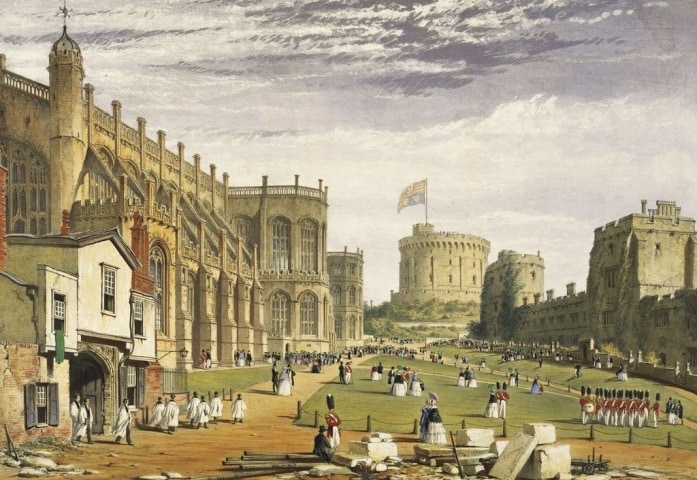
Windsor, St. George's Chapel, procession of choristers and clergy emerging through the gate of the Lower Cloister; Joseph Nash, Views of the interior and exterior of Windsor Castle (London: Thomas McLean, 1848)
https://www.royalcollection.org.uk/collection/919780/the-lower-ward (DIGITSED)
Summary
England (1820-1838)
According to his obituary, William Stanley was born at Windsor Castle on 29 May 1820, son of the organist of St. George's Chapel, Windsor. In his army records, however, he gave his place of birth as the nearby town of Egham.
His mother Ann Stanley had married William Sexton, organist and master of the choristers of St. George's, at Windsor on 8 August 1819, Sexton's previous wife, Elizabeth, having died in 1817. A daughter Ann was born at Windsor on 27 January 1822, and in a notice in the Sydney press in 1891 Stanley recorded the death at Eastbourne (UK) on 1 October, "in her 70th year" of his "eldest dearly beloved sister".
When Sexton wrote his will (on 24 February 1824) they were living at No. 19, Lower Cloisters. Sexton died by June 1824, and left his estate to Ann. On 23 June Sexton's son John, by his previous marriage, sold some of Sexton's music books to Windsor chapel.
On 29 August 1827, at Clewer, Ann Sexton married William Best (c. 1803-1880), a musician in the royal service. Having given birth to their daughter, Emma Best, in April 1828, Ann died on 14 May 1828, and was buried four days later by the dean of St. George's chapel, leaving William and two Sexton sisters, Ann and Phoebe (c. 1823-1886) in Best's care. A press report of a private performance by William in January 1830 identified Best as second oboist in the king's band and his stepson's musical instructor. Best was later appointed a life-member of the royal band, first appearing at the bottom of the list by seniority in 1837 and at the top in the year before his death.
As claimed in his obituary, William was principally educated in the Windsor chapel, as one of its six or seven singing boys. In this capacity, aged 10, he sang at the funeral of George IV, on 15 July 1830.
William had evidently become one of the Windsor singing boys during the latter part of the term of his father's successor, Charles Frederick Horn. Horn had been appointed by George IV, but outlived the king by only a little more than a month. William next came under the charge of Highmore Skeats the younger (b. c. 1785; d. Windsor, 24 February 1835), and perhaps also very briefly under his successor George Elvey (who also married Skeat's widow).
A Sexton of Windsor was among the trebles singing in the chorus at the Royal Musical Festival in Westminster Abbey in late June and early July 1834, and therefore almost certainly William (aged just 14) (A Mr. Sexton, of Windsor, perhaps his half brother John, had also been advertised among the tenors.)
A few months later, in September 1834, William appeared as a pianist in a public concert at Egham, when it was reported that:
the astonishing execution of Master Sexton, on the pianoforte, was truly delightful.
As William Stanley (the first documented time he used his mother's surname), and giving his age as 18 (correctly 16), he enlisted in the 80th Regiment, on 20 July 1836, probably at Chatham, in Kent, where the regiment was already stationed awaiting embarkation for New South Wales.
Despite being a soldier, he was still allowed to appear as a concert soloist, probably for the last time in England, at Rochester, in February 1837, playing two pieces by Herz, including the Variations on Non piè mesta.
Windsor, Sydney, and Parramatta, NSW (1838-47)
Stanley's obituary states that he arrived with a contingent of the regiment in New South Wales on a convict transport "about 1837". In fact, the regimental paylists record that he embarked from England on 7 March 1837, and therefore almost certainly on the Mangles, which landed at Sydney on 10 July.
Regimental paylists record that Stanley undertook general service on arrival, including some time with a detachment on the Illawarra in the early part of 1838.
In the paylists for the second quarter of the 1838, he appears for the first time listed as a member of the Band of the 80th Regiment. Under its master Samuel Edgerton, he most likely played clarinet or oboe, having probably been taught to play several woodwind instruments by his stepfather (Stanley later advertised that he himself taught the clarinet and flute).
Band duties and performances thus constituted Stanley's principal public musical engagement for the three years from mid 1838 to mid 1841.
He also appears to have been treated with unusual latitude by the commanding officer, Lieutenant-Colonel Narborough Baker, in allowing him to perform as a pianist, independently of the band, in public concerts, without acknowledgment of any connection with the regiment.
Stanley, accordingly, made his public debut in the colony at Eliza Wallace's Sydney concert, on 17 October 1838, performing an unidentified "concerto on the pianoforte" by Henri Herz (probably one of his variation sets).
During 1839, he again played a solo for Eliza Wallace on 27 February (Herz), and, after her marriage to John Bushelle, on 11 September a solo as well as accompanying the vocalists. He was soloist and piano accompanist for the Gautrots at their first Sydney concert on 26 April, and again for them at Windsor and Parramatta on 5 and 8 October. On the last occasion his solo was positively identified in a newspaper report as Herz's Variations on Non piè mesta from Rossini's Cenerentola.
Thereafter, during 1840 and the first half of 1841, his documented public performing appears to have been confined solely to playing with the band.
Stanley took his discharge from the regiment at Parramatta on 31 July 1841, and his next advertised public appearance was at Eliza Wallace Bushelle's Parramatta concert on 29 October 1841.
According to his obituary, he was for 8 years organist of St. John's church, Parramatta, and in January 1843 advertised that he was continuing as a teacher of the piano, clarinet, and singing from an address in Macquarie Street, Parramatta.
At St. John's, on 7 July 1846, he married Susannah New, daughter of Parramatta butcher, Edward New.
Many thanks to Joan Stanley, William's great-great grand-daughter, for sharing the results of her family history research (2015-ongoing), and to Joseph Waugh, for kindly sharing his reserach into Stanley as a former organist of Christ Church St. Laurence, Sydney
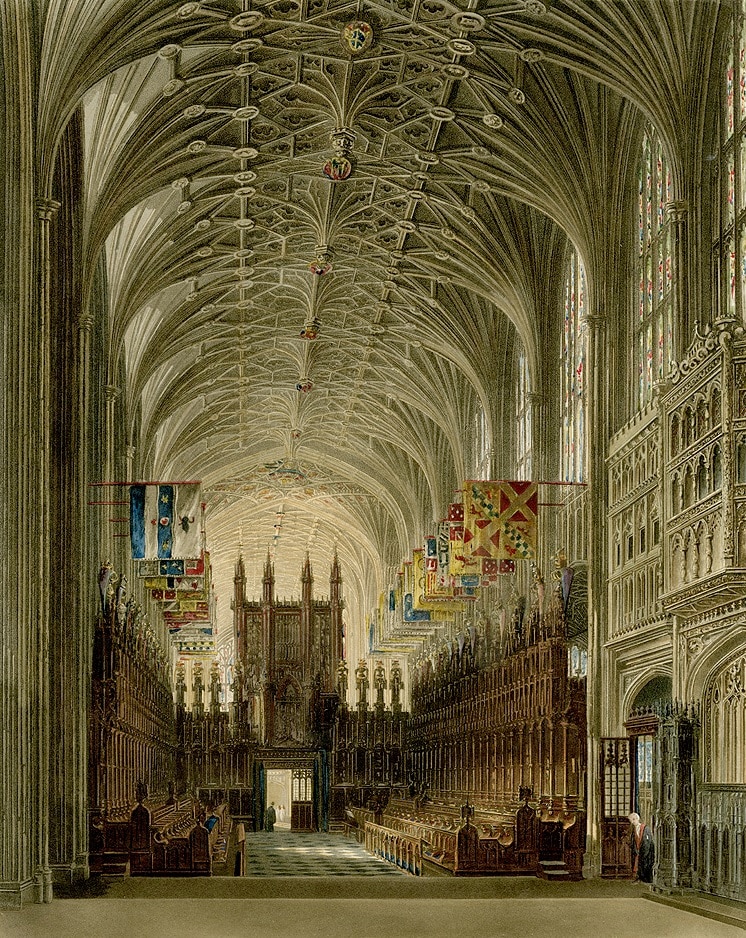
St George's Chapel Windsor, the choir, looking West, in W. H. Pyne, The history of the royal residences (1819)
Documentation (UK)
8 August 1819, marriage of William Sexton and Ann Stanley
Berkshire marriage index (copy sighted courtesy of Joan Stanley), William Sexton and Ann Stanley, 8 August 1819, Windsor
29 May 1820, birth of William Stanley
27 January 1822, birth of Ann Sexton
Baptism register, St. George's Chapel, Windsor; Fellowes 1957, 42
Ann, Daughter of William and Ann Sexton born January 27 1822 and baptized May 10th 1822.
John Sainsbury (ed.), A dictionary of musicians from the earliest ages to the present time . . . volume 2 (London: Sainsbury and Co., 1824), 432
https://books.google.com.au/books?id=z45TAAAAcAAJ&pg=PA432 (DIGITISED)
SEXTON, (WILLIAM) organist, subprecantor and master of the choristers of St. George's chapel, Windsor, and lay-clerk, &c. of Eton college chapel, was admitted as a chorister to both of the above chapels in 1773, being in the ninth year of his age; and here, in passing, we will remark, that one of the most singular circumstances in his life, is, that from the above period to the present, being a space of nearly fifty one years, he has never been absent from his professional duties so long as fourteen days at one time. He was next placed as a pupil under Edward Webb, a celebrated organist of Windsor and Eton, and brother-in-law to the late provost of Eton and canon of Windsor, Dr. J. Davis. He next officiated as deputy organist, &c. till the year 1801, when he was appointed organist of St. George's chapel, at the same time continuing his duties at Eton college, the organist there being alive, but past duty; so that both master and scholar may be said to be (to use a professional phrase) real cathedralists. Sexton has composed some anthems, canons, glees, songs, &c. but has not published any of them. In 1808, he printed a volume of eight anthems by Handel, composed for the duke of Chandos. These he shortened and arranged for the organ and voices, for the use of cathedrals.
Also Sainsbury 1825, volume 2, 432
https://books.google.com.au/books?id=kusGAAAAQAAJ&pg=PA432 (DIGITISED)
Will of William Sexton, organist of St. George's Chapel, Windsor Castle, 28 July 1824, National Archives UK, PROB 11/1688/447
http://discovery.nationalarchives.gov.uk/details/r/D160545
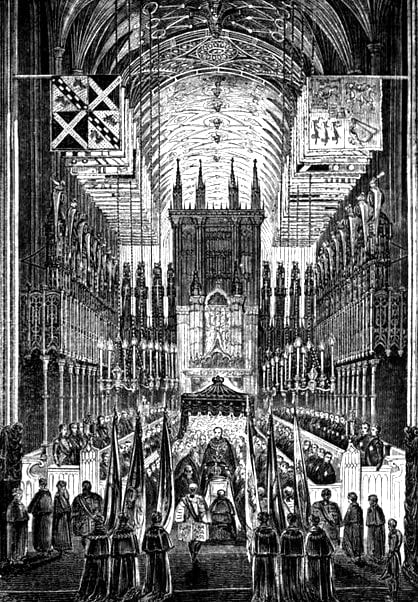
George IV's funeral, in St. George's Chapel, Windsor, The mirror (7 August 1830)
https://books.google.com.au/books?id=y7kRAAAAYAAJ&pg=PA121 (DIGITISED)
15 July 1830, funeral of George IV, Windsor Chapel
[Funeral of George IV], The Edinburgh evening courant (15 July 1830)
. . . The burial service was for the most part chanted, and the anthem sung with splendid effect. Nothing could be more sublime or touching that was the whole of the service . . .
Robert Huish, Memoirs of George the Fourth descriptive of the most interesting scenes of his private and public life . . . (London: Printed for T. Kelley, 1830), 255 footnote
https://books.google.com.au/books?id=ru5VAAAAYAAJ&pg=PA255 (DIGITISED)
It is impossible to have witnessed a more striking contrast than that which presented itself in the town of Windsor, at the funeral of the Princess Charlotte [1817] and that of George IV, her father. The former was a display of the deepest national sorrow . . . The funeral of George IV was a positive Jubilee. Crowds hastened to witness the pageantry of the spectacle; but not on a single countenance was observed an expression of grief. The Park was thronged with joyous parties, and shouts of revelry and mirth were interrupted only by the firing of the minute-gun, or the rolling of the carriages conveying the mourners to the ceremony. Under one tree was heard the glee of "When Arthur first at Court began," and under another "A merry king, and a merry king, and a right merry king was he;" whilst in the streets of the town, in the immediate vicinity of the Castle, where lay in all the magnificence of royalty, and all the littleness and insignificance of humanity, the putrifying remains of England's sovereign defunct, a kind of fair was held, where the life and Portrait of the late King, of blessed memory, were to be had for one penny; and the amours of the Marchioness of Conyngham, as a necessary appendix, for a penny also.
January 1830, Windsor
![[News], Windsor and Eton Express (9 January 1830), 3](imageslocal/stanley-sexton-1830-01-09.jpg)
[News], Windsor and Eton Express (9 January 1830), 3
https://www.britishnewspaperarchive.co.uk/viewer/bl/0000413/18300109/024/0003 (PAYWALL)
We had an opportunity the other evening of hearing our little townsman Sexton, perform on the Piano Forte. He is not nine years old, and is able to play the compositions of PLEYEL, RIES, KALKBRENNER, GELINEK, &c., with perfect ease: no passages seem too difficult for him even at sight; he has a strong left hand and shakes well with it. He has neither father nor mother, but had been instructed by his worthy father-in-law, Mr. BEST, second oboe in his Majesty's band: but as this gentleman has a large family to support besides, he cannot afford to let him have such masters as (having attained to so great a proficiency) it is desirable he should have. This seems a fit case for the consideration of the Royal Academy of Music: the boy is a fine and rare specimen of native musical talent, - and to cultivate this talent is the grand object of the Academy. Although, we said before, he can play any piano forte music however difficult, yet he seems to play it without feeling, and a want of taste and expression in particular passages is observable in consequence. However at his tender age it would be very unfair to say that he will not have taste, or that by a judicious cultivation it may not acquired. What is very much in his favor is the extraordinary accuracy of his ear. Standing with his back to the Piano Forte, on another person's sounding a note or any combination of notes, he will immediately name the note or notes which have been sounded: * * * * * This is the more remarkable as he is entirely ignorant of thorough bass.
The following paragraph on the subject of young SEXTON'S abilities appeared in an evening London paper: -
"MUSICAL PRECOCITY. - A remarkable instance of precocious talent in music has been exhibited in a few private circles of the metropolis during the present week. An orphan boy, of the name of Sexton, about eight years of age, not only plays the most difficult concertos of Kalkbrenner, Craimer [sic], Moschelles, &c., but he himself composed a series of variations on the national air, "God save the King," which would not disgrace any adult musician of the day. We understand the youth is one of the choir of His Majesty's Chapel, Windsor.' - British Traveller.
30 April 1832, remarriage of Stanley/Sexton's stepfather, William Best
[Married], Berkshire Chronicle and Windsor Herald (5 May 1832), 1
https://www.britishnewspaperarchive.co.uk/viewer/bl/0000358/18320505/001/0001 (PAYWALL)
Married on Monday last, at St. Martin's Church, London, Mr. William Best, trumpeter in her Majesty's band, to Miss Caroline Parker, of New Windsor -
"So blithely gay were the notes he play'd,
"He won the heart of the Windsor Maid."
4 August 1833, St. George's chapel, Windsor
"WINDSOR & ETON. THEIR MAJESTIES", Windsor and Eton Express (10 August 1833), 4
https://www.britishnewspaperarchive.co.uk/viewer/bl/0000413/18330810/045/0004 (PAYWALL)
On Sunday morning . . . Soon after 11 o'clock THEIR MAJESTIES proceeded to St. George's chapel, where they attended Divine worship . . . Miss Caney's delightful anthem from the 25th Chapter of Revelations was effectively performed by Masters Wicks and Sexton, and the gentlemen of the choir. Mr. Skeats presided at the organ . . .
Late June and early July 1834, Royal Musical Festival, Westminster Abbey
"Royal Musical Festival in Westminster Abbey", The mirror of literature, amusement, and instruction 24/670 (5 July 1834), supplement 19
https://books.google.com.au/books?id=M1QYAQAAIAAJ&pg=PA19 (DIGITISED)
. . . THE CHORUS. Superintendent, Mr. J. T. Harris. Cantos. - Miss Addison, Mrs. Allcroft . . . Miss Wallace, Mrs. Willis, Miss Yates, Masters Boardman and Buckland (St. Paul's), Charlton, Chipp, and Cooke (Chapel Royal) . . . Harris (Windsor) . . . Pullen (Windsor) . . . Sexton (Windsor) . . . Webber (Windsor), Wilson, Woodham (St. Paul's) . . .
An account of the musical performances in Westminster abbey . . . 1784, in commemoration of Handel, to which is added a notice of the forthcoming Royal Musical Festival of 1834 (London: Duff and Hodgson, 1834), xxxi
https://books.google.com.au/books?id=uTxHJWe7PWUC&pg=PR1&q=sexton (DIGITISEDI
. . . TREBLES . . . Six Windsor Boys . . . TENORS . . . Mr. Sexton, Windsor . . .
NOTE that there was also a Master Sexton of Norwich cathedral listed among the altos; not to be confused with William, that other Sexton was also active as a concert singer in and around Norwich in 1834.
4 September 1834, concert at Egham
"EGHAM, SEPTEMBER 5", Windsor and Eton Express (6 September 1834), 4
https://www.britishnewspaperarchive.co.uk/viewer/bl/0000413/18340906/037/0004 (PAYWALL)
Mr. G. Hollis's concert at the Assembly-room, in this town, on Thursday evening, was very numerously and respectably attended, and if we may judge from the encores, the company were much delighted with the performances. Mrs. Sewell was in excellent voice, and sang several favourite songs. We were particularly pleased with The Knight's farewell, by Mr. Field, and the Water Drinker, given in great style by Mr. Eastgate; both these, together with the glee of Mynheer Von Dunk, were highly applauded. In the instrumental part, the astonishing execution of Master Sexton, on the pianoforte, was truly delightful; several beautiful overtures were played by a full band with the greatest taste and science.
20 July 1836, enlisted in 80th Regiment, at Chatham, Kent
Nominal and descriptive roll of the 80th Regiment, 1836; UK National Archives; Australian Joint Copying Project
https://nla.gov.au/nla.obj-2387603003 (DIGITISED)
1321 / 20 July 1836 / [Age] 18 [years] - [months] [sic] / [Height] 5 [feet] 6 3/4 [inches]
80th regiment, paylists, July to September 1836; UK National Archives, WO 12/8478; Australian Joint Copying Project
https://nla.gov.au/nla.obj-1660924276 (DIGITISED)
Number added to, or promoted, in the Regiment since 30th June 1836 . . .
[29] / [Private] / W. Stanley / 20 [July 1836] . . .
8 February 1836, concert, Rochester, Kent
"APOLLONIAN CONCERTS", South Eastern Gazette (14 February 1837), 4
https://www.britishnewspaperarchive.co.uk/viewer/bl/0001097/18370214/035/0004 (PAYWALL)
The fourth of a series of concerts, under the above appellation, took place Wednesday last, at the Rochester Assembly Room, before a very large assemblage of the subscribers; the vocal department receiving the assistance of Mr. Young, of the Chapel Royal, Windsor, and it is gratifying to assert that the exertions the performers gave decided satisfaction. The contiguity of the military establishments affords facility to the conductors of these concerts for obtaining orchestra of more than common ability, the performers in which are so well accustomed to each other as to through their overtures with a steadiness and precision, rising occasionally into excellence this may especially be said of their performance at this concert of the overtures to the "Slave," "Zampa," and "Fidelio," the whole of which gained great and deserved applause. Beethoven's "Symphony No. 2," which was played, is too long, and should be addressed only to musical and professional ears; it wanted the relief necessary to a promiscuous audience. Before, however, we dismiss the instrumental department, some notice must be bestowed upon the pianist, a young man who we are informed belongs to the band of the 80th regiment, who performed Hertz's variation upon the air "Non piu mesta," and a second divertimento by the same author, with degree of power and brilliancy which indicated the possession of great talent . . . [The above is from a correspondent . . .]
7 March 1837, embarkation with the 80th Regiment, for NSW
80th regiment, paylists, January to March 1837; UK National Archives, WO 12/8478; Australian Joint Copying Project
https://nla.gov.au/nla.obj-1660962354 (DIGITISED)
[No.] 1321 / Stanley William / [paid until] 20 July / . . . [On Guard Australian Colonies] Embarked 7th March 1837
Documentation (Australia)
1837
10 July 1837, arrival of detachment of the 80th Regiment
"SHIPPING INTELLIGENCE", The Sydney Herald (13 July 1837), 2
http://nla.gov.au/nla.news-article12859342
ARRIVALS. From Portsmouth, on Monday last, having sailed from thence the 23rd of March, the ship Mangles, Captain Carr, with 308 male Convicts, under the superintendence of Dr. Logan, Surgeon, R. N. The guard comprises the headquarters of the 80th Regiment, namely, Major Nunn, Lieutenant Lockhart, Ensign Kelson, and thirty-two rank and file of the 80th Regiment . . .
1838
January to March 1838, on general duty, Illawarra, NSW
80th Regiment, paylists, January to March 1838; UK National Archives, WO 12/8478; Australian Joint Copying Project
https://nla.gov.au/nla.obj-1661104044
1321 / Stanley William / . . . / [First muster] Illawarra / [Second muster] Illawara
April to June 1838, first listed as member of the Band of the 80th Regiment
80th Regiment, paylists, April to June 1838; UK National Archives, WO 12/8478; Australian Joint Copying Project
https://nla.gov.au/nla.obj-1661219905 (DIGITISED)
1321 / Stanley William / . . . / Band
17 October 1838, Eliza Wallace's concert, first advertised public performance in Sydney
[Advertisement], The Australian (9 October 1838), 3
http://nla.gov.au/nla.news-article36859351
Under Distinguished Patronage. MISS WALLACE BEGS to inform her Friends and the Public, that her Concert
of Vocal and Instrumental Music, will take place on the 17th instant, in the Saloon of the Royal Hotel; on which occasion she
will be assisted by Mr. J. P. Deane and family, a celebrated Vocal Amateur, Mr. Worgan, Mr. W. Stanley, Mr. Sippe, Miss A.
Winstanley, and Mr. Wallace.
Programme. Part 1st . . . 4. Concerto - Pianoforte - HERZ, Mr. W. Stanley . . .
By the kind permission of Colonel Wodehouse, Miss Wallace will be assisted by the Band of the 50th regiment . . .
"THE CONCERT", The Sydney Monitor (19 October 1838), 2
http://nla.gov.au/nla.news-article32161581
The lovers of music were regaled on Wednesday evening, at Miss Wallace's concert, with a treat seldom to be met with in this colony. The bill of fare was excellent and all went off in a style highly gratifying to the audience, who consisted of the most respectable families in Sydney. The overture to "Otello", by the orchestra, and to the "Bronze Horse" by the military band, were executed in a most superior manner . . . A concerto on the Pianoforte by Mr. W. Stanley was played in a masterly style . . .
"Miss Wallace's Concert", Commercial Journal and Advertiser (20 October 1838), 2
http://nla.gov.au/nla.news-article226460437
. . . Mr. Stanley, performed on the Pianoforte, A Concerto by Herz, which showed him at once to be a master of this instrument. This young performer is quite a stranger to our musical world . . .
"CONCERT", The Sydney Herald (22 October 1838), 2
http://nla.gov.au/nla.news-article12859991
. . . A Mr. Stanley played one of Herz's concertos on the piano forte fairly, but nothing more . . .
ASSOCIATIONS: Eliza Wallace (vocalist); John Philip Deane and family; "celebrated vocal amateur" = John Bushelle; George William Worgan (vocalist); George Sippe (cellist, ? pianist, accompanist); Ann Winstanley (vocalist); Spencer Wellington Wallace (violinist, flautist); Band of the 50th Regiment
1839
27 February 1839, Eliza Wallace's concert
[Advertisement], The Sydney Monitor (27 February 1839), 1
http://nla.gov.au/nla.news-article32163032
Under the Patronage of Lady Gipps.
MISS WALLACE has the honour to announce that her
Concert of Vocal and Instrumental Music will take place on
WEDNESDAY Evening, February 27, 1839, in the Saloon of the Royal Hotel,
on which occasion she will be assisted by Miss Ellard, just arrived in this Colony, the Vocal Amateur who was received with such
enthusiastic applause at the two last Concerts, Mr. Worgan,
Mr. W. Stanley, and Mr. S. W. Wallace, and, by the permission of Colonel
Wodehouse, the Band of the 50th Regiment . . .
Part II . . . 3. Solo, Piano Forte . . . Herz - Mr. W. Stanley . . .
"The Concert", The Sydney Monitor and Commercial Advertiser (1 March 1839), 2
http://nla.gov.au/nla.news-article32163068
. . . Mr. Stanley's Solo on the grand Piano was more noisy than brilliant, but displayed prodigious execution. The piece was one which could not well be spoilt, otherwise, Mr. Stanley, like Mr. Wallace, did all he could by "bounce" (as a good judge near us expressed it) to do so, by his heavy blows on the keys. We pitied the poor author. His mind. the character of the piece, was shivered into atoms by a peal of sonorous jingles. What an audience wants is, music, the soul and poetry of music, the sentiment of music, whether it be lofty, merry, pathetic, or mournful; not display. If musicians and vocalists wish to display, if they wish to shew what the human hand and fingers can perform on keys, or cat-gut, or a hollow piece of wood, let them call together an audience of their own class, professors and amateurs; and let them gallop up and down the gamut with all the vain frippery and shew they may; but do not let them demand 7s. 6d. of the public to come and listen to music, and then give them mechanical tinklings in lieu. We would rather hear an Eolian harp a thousand times; for though the strains be irregular and without order or apparent design, they are natural; full of pathos or dignity, and the most vulgar and illiterate feel their souls touched with the heavenly concords . . .
"THE CONCERT", The Colonist (2 March 1839), 3
http://nla.gov.au/nla.news-article31722651
. . . We have to speak in the highest terms of Mr. W. Stanley as a piano-forte player, he is evidently a perfect master of the instrument, and his performance was not more rapturously applauded than it deserved . . .
"THE CONCERT", The Sydney Gazette and New South Wales Advertiser (2 March 1839), 2
http://nla.gov.au/nla.news-article2551019
. . . we must not, however, omit mentioning Mr. Stanley's execution on the piano; for so young a man, he deserves the greatest credit . . .
ASSOCIATIONS: Barbara Ellard (pianist)
26 April 1839, the Gautrots' concert
[Advertisement], The Sydney Herald (26 April 1839), 1
http://nla.gov.au/nla.news-article12858967
GRAND CONCERT. M. & MME. GAUTROT
HAVE the honor to announce that their CONCERT will take place on
FRIDAY EVENING, April 26, 1839, in the Saloon of the Royal Hotel, on which occasion
His Excellency the Governor and Lady Gipps, His Excellency Major-General Sir Maurice O'Connell, K. C. H.,
and Lady O'Connel have kindly signified their intention of being present.
Monsieur and Madame Gautrot will have the valuable assistance of Miss Wallace, Mr. W. Wallace,
Mr. W. Stanley, and the Amateur whose performance at the three last Concerts gave such satisfaction.
By permission of Colonel Wodehouse, the Band of the 50th Regiment will attend.
The Overture to "La Vestale," Spontini.
1. Duet, from Tancredi," Ah, se de mali miei," Rossini - Miss Wallace & Madame Gautrot
2. Song, "Some love to roam" - Amateur
3 "Le Rossignol," Lebrun. - Madame Gautrot
4. "Black-eyed Susan." - Miss Wallace
5. "Eh ben per mia memoria," from the Gazza Ladra - Madame Gautrot and Amateur
6. "Dall 'Asilo della pace," Costa. - Miss Wallace
7. "Suoni la Tromba," from I Puritani - Miss Wallace and Amateur
8. "Non pui Andrai," Mozart, accompanied by the full band - Amateur
PART II.
Overture by the Military Band.
1. Solo, Violin, Air varié - M. Gautrot
2. Trio, "Fatal Moment! Cruel Mystere," from "Robert le Diable" - Miss Wallace and Amateur
3. Song, "The Spring time in coming." - Miss Wallace
4. Duet, "Care Zitelle," Curcio - Madame Gautrot and Amateur
5. "La Muette de Portici," Auber. - Madame Gautrot
6. Duet, "All'idea de quell Metallo," Rossini - Miss Wallace and Amateur
7. Concerto, Pianoforte. - Mr. W. Stanley
8. "Largo al Factotum," Rossini. - Amateur
The Concert will commence at eight o'clock.
"THE CONCERT", The Sydney Herald (29 April 1839), 2
http://nla.gov.au/nla.news-article28653643
Monsieur and Madame Gautrot gave a Concert of Vocal and Instrumental Music, in the Saloon of the Royal Hotel, on the evening of Friday last . . . In conclusion, it is but just to state, that the vocal parts were admirably accompanied on the piano-forte by Mr. Stanley, whose talents as a musician are evidently of a superior order.
"THE CONCERT", The Colonist (1 May 1839), 3
http://nla.gov.au/nla.news-article31722996;
. . . No small share of credit is due to Mr. W. Stanley for his talented accompaniments and performances on the pianoforte . . .
ASSOCIATIONS: Joseph Gautrot (violinist) and Madame Gautrot (vocalist)
11 September 1839, Eliza (Wallace) Bushelle's concert, Royal Victoria Theatre
[Advertisement], The Sydney Herald (11 September 1839), 1
http://nla.gov.au/nla.news-article12859455
ROYAL VICTORIA THEATRE.
MRS. BUSHELLE, (late Miss Wallace), begs to inform her Friends and the Public, that her
CONCERT of Vocal and Instrumental Music, will take place at the
Theatre Royal, THIS EVENING, the 11th instant; she will be assisted by Monsieur and Madame Gautrot, and Mr. Bushelle;
Mr. W. Stanley, Pianist; Mr. S. W. Wallace; Mr. Peck; Mr. Leggatt; Mr. Wallaoe, Senior; Mr. Sippe;
Mr. Curtis; and all the Theatrical Band, and by kind permission of Colonel Wodehouse, the Band of the 50th Regiment.
PROGRAMME.
PART I.
Overture to William Tell, Rossini - Full Band
1 - "Suoni la Tromba," Grand Duet from the Puritani, Bellini - Mr. & Mrs. Bushelle
2 - "Al dolce Canto," with variations, as sung by Madame Catalini, Rode - Madame Gautrot
3 - "Now with grief no longer bending," as sung by Mrs. Wood in Cinderella, Rossini - Mrs. Bushelle
4 - "Some love to roam," Russell - Mr. Bushelle
5 - Solo, Violin - Monsieur Gautrot
6 - Duet "Ah sede Mali miei, Rossini - Madame Gautrot and Mrs. Bushelle
7 - Concerto Pianoforte, Herz - Mr. W. Stanley
8 - "Povera Signora," by particular desire - Madame Gautrot
9 - "Miei rampolli femminini favorite," Buffo Song, as sung by Signor Lablache, in the Cenerentola, accompanied by the full Band - Mr. Bushelle
PART II.
Overture to the Barbiere de Seviglia.
1- "The Rossignol," Song, (Flute Obligato by Mr. S. Wallace) Lebrun - Madame Gautrot
2 - "Suona din din," duet, from Zauberflote, Mozart - Mr. & Mrs. Bushelle
3 - Flute Solo, Tulou - Mr. S. W. Wallace
4 - "Il mio tesoro intanto," Song, Mozart - Mrs. Bushelle
5 - "Dunque io sono," Duet, Rossini - Madame Gautrot and Mrs. Bushelle
6 - "To Norma's arms," Song, Bellini - Mrs. Bushelle
7 - "Let others rejoice," Song, Russell - Mr. Bushelle
8 - "Black-eyed Susan," by particular desire - Mrs. Bushelle
9 - "Rule Britannia," Madame Gautrot, who will endeavour to sing it with English words . . .
"MRS. BUSHELLE'S CONCERT", The Sydney Herald (13 September 1839), 2
http://nla.gov.au/nla.news-article12859063
. . . Mr. Stanley, the pianist, afforded very effectual assistance in his accompanmient.
"THE CONCERT", The Australian (14 September 1839), 2
http://nla.gov.au/nla.news-article36862176
The Royal Victoria never held within its walls so brilliant an assemblage as that of Wednesday evening . . . Monsieur Gautrot and Mr. Stanley, the former on the violin and the latter on the piano, executed their portion of the evening's entertainments with their usual superiority, and to the delight of their auditors, and were frequently interrupted with applause . . .
"MRS. BUSHELLE'S CONCERT", The Colonist (14 September 1839), 2
http://nla.gov.au/nla.news-article31723704
. . . Mr. Gautrot's solo on the violin was exquisite, so was Mr. Stanley's concerto on the pianoforte . . .
"MRS. BUSHELLE'S CONCERT", Commercial Journal and Advertiser (14 September 1839), 2
http://nla.gov.au/nla.news-article226455348
. . . The "Concerto Pianoforte," by Mr. Stanley, was a grand performance, and unquestionably the best we have heard him make. His touches both piano and forte are those of a master of the instrument, calculated to penetrate the very soul of harmony . . .
5 and 8 October 1839, the Gautrots' concerts, Windsor and Parramatta
[Advertisement], The Sydney Monitor and Commercial Advertiser (2 October 1839), 3
http://nla.gov.au/nla.news-article32165751
MONSIEUR AND MADAME GAUTROT Have the honor to announce to the Inhabitants of Windsor and its
Vicinity, that their CONCERT of Vocal and Instrumental Music, WILL take place at the
COURT-HOUSE, WINDSOR, on SATURDAY EVENING NEXT, October 5, at Half-past Seven o'Clock precisely.
They will be assisted by Mr. and Mrs. BUSHELLE; Mr. EDGERTON; Mr. W. STANLEY, Pianist;
and (by the kind permission of COLONEL BAKER,) the Band of the 80th Regiment.
PROGRAMME.
PART I.
OVERTURE - Military Band
1 - DUET, 'Au clair de la Lune' - Mad. Gautrot and Mr. Bushelle
2 - SONG, 'Black eyed Susan' - Mrs. Bushelle
3 - SONG, 'Una Voce,' Rossini - Mad. Gautrot
4 - SONG, ' My boyhood Home,' Rooke - Mr. Bushelle
5 - CONCERTO, Violin, - Monsieur Gautrot
6 - SONG, 'I tuoi frequenti palpiti,' Pacini - Mrs. Bushelle
7-SONG, ' Povera Signora,' Auber - Mad. Gautrot
S - SONG, ' Non piu Andri' accompanied by the full Band, Mozart - Mr. Bushelle.
PART II.
1 - DUET, from 'Barber of Seville,' Rossini - Madame Gautrot and Mr. Bushelle
2 - SONG, 'Mary of Castle Carey,' Mrs. Bushelle
3 - SONG, 'Some love to roam,' Russell - Mr. Bushelle
4 - CONCERTO, Pianoforte - Mr. Stanley
5 - 'All'idea di quel Metallo,' Rossini - Mr. and Mrs. Bushelle
6 - 'The Spring time is coming,' Stockkausen - Mrs. Bushelle
7 - 'Largo at Factotum,' Rossini - Mr. Bushelle
8 - 'RULE BRITANNIA,' accomplaied by the Full Band - Madame Gautrot.
TICKETS - SEVEN AND SIXPENCE EACH,
To be had of Mr. EDGERTON, Band Master 80th Regt. and at the principal Hotels, Windsor.
[Advertisement], The Australian (8 October 1839), 1
http://nla.gov.au/nla.news-article36861372
"CONCERT AT PARRAMATTA", The Colonist (12 October 1839), 3
http://nla.gov.au/nla.news-article31723835
The concert was not numerously, but very respectably attended, which may be attributed to the very short time allowed for circulating the information as to the when and where. The pieces were well selected and appeared to give general satisfaction, with the exception of the overtures by the military band, which were as bad and discordant as it is possible to imagine. Bushelle's Largo al factotum, which was given with his usual judgment and spirit, seemed to please the most; next to which, was Mrs. Bushelle's sweet ballad, Mary of Castle Carey, and Madame Gautrot's petit chanson comique, Povera Signora. Mr. Stanley played Hertz's variations on Non piu Mesta, on the pianoforte, in a masterly manner, and Mons. Gautrot, an air and variations on the violin, by Rode, in a manner worthy of a disciple of the school of the charming Viotti. - Correspondent.
ASSOCIATIONS: Samuel Edgerton (bandmaster of the 80th); Band of the 80th Regiment (Stanley's regiment)
MUSIC: Variations brillantes on Rossini's Cenerentola [Non piu mesta] (Henri Herz)
1840
? [Advertisement], The Sydney Gazette and New South Wales Advertiser (1 February 1840), 3
http://nla.gov.au/nla.news-article2547025
HARP TUITION. MRS. STANLEY, professor of the Harp, respectfully begs to inform the Public that she gives instructions on that Instrument at home and abroad. Terms may be known by applying to Mrs. STANLEY at Mr. Wilson's, Artist, Morgan's Buildings, Kent-street North.
? "HARP AND PIANO", The Sydney Gazette and New South Wales Advertiser (4 February 1840), 2
http://nla.gov.au/nla.news-article2545009
Mrs. Stanley, a lady recently arrived in this Colony, proposes to give instruction on the harp, that sweetest of stringed instruments when well played. Mrs. Stanley has informed us that neither pains nor expense have been spared to qualify her as a professor. She has had the advantage of the best master London can boast of. We hope she may meet with adequate and remunerative support from those who love to discourse sweet melody.
ASSOCIATIONS: Nothing further is known for certain about this Mrs. Stanley, or whether she and William Stanley were in any way related
1841
31 July 1841, discharged from the 80th Regiment, Parramatta
80th Regiment of Foot, paylist, July to September 1841; UK National Archives, WO 12/8478; Australian Joint Copying Project
https://nla.gov.au/nla.obj-1661606895 (DIGITISED)
1321 / Stanley William / [paid to] 31st July / Discharged on 31st July on payment of £20
https://nla.gov.au/nla.obj-1661614140 (DIGITISED)
1321 / Stanley William / [place of birth] Egham, Middlesex / [Trade when enlisted] Musician / [How become non-effective] [Discharge] / [Place and Day] Parramatta, 31 July 1841.
Nominal and descriptive roll of the 80th Regiment, 1804-1881 (Australian Joint Copying Project, from Records of the Staffordshire Regiment Museum)
https://nla.gov.au/nla.obj-2387603003 (DIGITISED)
29 October 1841, Eliza Bushelle's concert, Parramatta
[Advertisement], Australasian Chronicle (28 October 1841), 3
http://nla.gov.au/nla.news-article31733239
UNDER DISTINGUISHED PATRONAGE. PARRAMATTA.
MRS. BUSHELLE, assisted by Mrs. J. S. Prout, Signorina Emilia, Mr. W. S. Wallace, Mr. Worgan,
Mr. W. Stanley, Mr. Bushelle, and Amateurs, will give her Farewell Concert, at
Nash's Hotel, Parramatta, Tomorrow Evening, the 29th October, 1841.
Tickets to be had at Walker's and Nash's Hotel.
ASSOCIATIONS: Maria Prout (harpist, pianist); Signorina Emilia (vocalist)
1843
[Advertisement], The Sydney Morning Herald (12 January 1843), 3
http://nla.gov.au/nla.news-article12426887
MR. W. STANLEY, in returning thanks to his friends and the public of Parramatta,
and its vicinity, for their favours during the past year, begs to inform the public that he continues
to give instructions on the Pianoforte, Clarionet, and in singing.
N.B.- Pianofortes tuned.
Macquarie street, Parramatta, Jan. 12.
24 April 1843, Queen's birthday teetotal festival, Parramatta
"TOTAL ABSTINENCE MEETINGS OF THE WEEK . . . PARRAMATTA", The Sun and New South Wales Independent Press (27 May 1843), 2
http://nla.gov.au/nla.news-article228130825
The members of the Parramatta Total Abstinence Society held a grand festival in honour of the Queen's Birthday, on Wednesday last, which was numerously and respectably attended by the principal families in the town and neighbourhood, there being upwards of 400 persons present . . .
The festival was held in the Catholic School-room . . . the company were entertained by performances on the pianoforte and seraphine by Mr. Stanley, of Sydney, Miss Murray, and Miss Reynolds, (niece to A. Murray, Esq.,) to whom much credit is due for their valuable services, both in the tasteful decorations of the festival and their unwearied exertions during the evening to contribute to its harmony; also the young ladies of Mrs. Davis's seminary, whose proficiency in the "divine art" astonished many good judges . . .
"PARRAMATTA TOTAL ABSTINENCE SOCIETY", The Teetotaller and General Newspaper (31 May 1843), 3
http://nla.gov.au/nla.news-article228139512
On Wednesday evening last, the Total Abstinence Society in this Town, held its first grand Festival in the Catholic School Room, in honor of the birth-day of our beloved Sovereign. At an early hour, our town crier was heard sounding his melodious symbol reminding the inhabitants of the auspicious day, they were about to celebrate . . .
During the repast the usual loyal and other appropriate toasts were drank, in which even the fair sex were not ashamed to partake, the pianoforte was moreover admirably handled by Mr. Stanley of this town, after each toast. After the repast, dancing commenced in good earnest, which was kept up with great spirit until half-past 11 o'clock, being half an hour exceeding the time announced from the chair. During the dancing, and at intervals, we had the pleasure to hear Miss Murray, the lovely daughter of Andrew Murray, Esq., and her cousin, Miss Reynolds, perform with great execution on the pianoforte, as also some of the amiable young ladies at Mrs. Davies' seminary, whose performances not only in that delightful art, but also in tripping the light fantastic toe, elicited the warmest admiration . . .
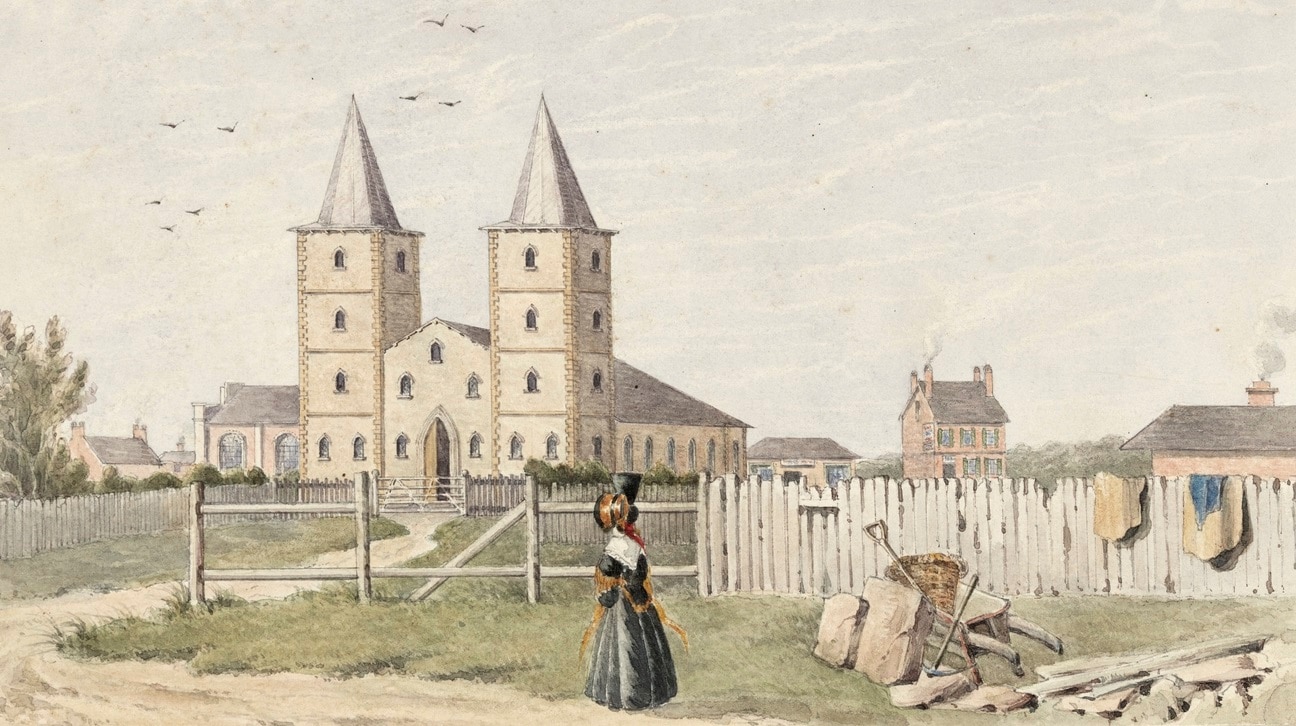
St. John's Church, Parramatta, c.1840-50 (State Library of New South Wales)
http://archival-classic.sl.nsw.gov.au/item/itemDetailPaged.aspx?itemID=423662 (DIGITISED)
15 October 1843, evening service, St. John's church, Parramatta
"ST. JOHN'S CHURCH", The Australian (19 October 1843), 3
http://nla.gov.au/nla.news-article37117674
On Sunday evening this church was for the first time opened for evening service. It was lighted by "Patent Solar Lamps," burning the common oil, and the effect produced is stated to be fully equal, if not superior, to the "Argand" with sperm oil. The Episcopalian inhabitants have long been desirous of an evening service, and they manifested their satisfaction at the alteration by a crowded attendance. The liturgy was read by the Rev. H. H. Bobart, and a most impressive discourse was delivered by the Rev. W. B. Clarke, M. A. who endeavoured to improve the occasion of the two recent sudden deaths in the town. The chaunting services were good, and were beautifully accompanied on the organ by Mr. Stanley.
ASSOCIATIONS: Henry H. Bobart (incumbent); William B. Clarke (preacher)
1844
26 January 1844, anniversary day teetotal festival, Parramatta
[Advertisement], The Australian (25 January 1844), 2
http://nla.gov.au/nla.news-article37121024
THE FIFTY-SIXTH ANNIVERSARY OF THE COLONY.
A GRAND TEETOTAL FESTIVAL, IN AID OF THE FUNDS FOR RAISING A BAND.
The above Festival will take place, and commence at Six o'clock in the Evening of the
26th Instant, in the Roman Catholic School Room, Parramatta, and be conducted similar to that on the Queen's last Birthday.
Mr. William Stanley, Professor of Music, has kindly consented to conduct the Musical department, gratuitously.
The Public are also informed, that a Sub-Committee has pledged itself to use every exertion to
give satisfaction; Tickets may be had at 2s. each, of the following persons, viz.: Messrs. Stanley, Lewthwaite, Staff,
Mason, Neale, McMahon, G. Oakes, Esq., and the Rev. Mr. Coffey, Parramatta; and also of Mr. James Fletcher, Temperance
Coffee House, Pitt-street, Sydney. January 22.
"ANNIVERSARY FESTIVAL", Parramatta Chronicle and Cumberland General Advertiser (3 February 1844), 3
http://nla.gov.au/nla.news-article228249609
The only thing that distinguished the Anniversary day in Parramatta, was the Teetotal Festival, which was got up creditably, and was tolerably well attended. The room was tastefully adorned with evergreens, and an illuminated transparency. The tea, coffee, viands and fruits provided, were substantial and good, as was also the attendance of the waiters, and gentlemen of the committee, upon the ladies. Mr. Stanley presided at the Piano, and quadrilles and country dances were kept up with spirit to a late hour.
24 December 1844, police court, Parramatta
"Police Intelligence . . . TUESDAY", Parramatta Chronicle and Cumberland General Advertiser (28 December 1844), 2
http://nla.gov.au/nla.news-article228249753
James H. Fullard, remanded from Saturday, was again examined. Mr. Heydon substantiated the evidence given by his Clerk, on Saturday, and as there was a flute belonging to Mr. Stanley, the music-master, discovered to have shared a similar fate to the watch the further remanding of the case until Thursday, in order to afford time for Mr. Stephenson, to whom it had been sold, to produce the article, took place.
ASSOCIATIONS: James Henry Fullard
1845
[Advertisement], The Cumberland Times and Western Advertiser (13 December 1845), 3
http://nla.gov.au/nla.news-article228065949
Notice of Removal.
MR. W. STANLEY, Professor of Music; begs to acquaint his friends of Parramatta, and its vicinity,
and the Public in general, that he has removed to the corner of Macquarie and Church streets,
close to St. Johns Church. Parramatta, 4th Dec., 1845.
1846
7 July 1846, marriage of William Stanley and Susannah New
"MARRIED", The Sydney Morning Herald (9 July 1846), 3
http://nla.gov.au/nla.news-article12888322
On Tuesday last, by special license, at St. John's Church, Parramatta, by the Rev. H. H. Bobart, M.A., Mr. William Stanley, Professor of Music, to Susannah Sarah, eldest daughter of Edward New, Esq., of Parramatta.
ASSOCIATIONS: Edward New (d. 1854), butcher, of Church Street, Parramatta; see:
"To the editors", The Sydney Morning Herald (26 August 1843), 3
http://nla.gov.au/nla.news-article12410644
1847
[Advertisement], The Sydney Morning Herald (24 September 1847), 1
http://nla.gov.au/nla.news-article12893575
WANTED TO PURCHASE, FOR CASH, a first-rate cabinet Pianoforte, 6 or 6 1/2 octaves.
Also, a good second-hand Pianoforte; a square would be preferred.
Apply to Mr. STANLEY, Professor of Music, Hyde Park.
Sydney, September 22.
6 October 1847, Stanley, concert, Nash's hotel, Parramatta
[Advertisement], The Sydney Morning Herald (1 October 1847), 1
http://nla.gov.au/nla.news-article12889210
CONCERT. MR. STANLEY begs most respectfully to inform the inhabitants of Parramatta and its vicinity, that he intends giving a Concert of Vocal and Instrumental Music, at Nash's Long Room on Wednesday next, the 6th of October, on which occasion he humbly solicits their patronage and support.
1848
[Advertisement], The Sydney Morning Herald (9 February 1848), 1
http://nla.gov.au/nla.news-article12889344
MR. STANLEY, Professor of Music, (late of Parramatta,) begs to inform the inhabitants of Sydney and its vicinity,
that he still continues to give lessons on the Piano-forte, Singing, &c.
Mr. S. having had the honour of instructing (while in Windsor) the families of S. North, Esq., late Police Magistrate;
Mr. Cox, Esq., Hobartville; F. Beddek, Esq., - Cope, Esq.;
and in Parramatta of the late Colonel Wall, - Brown, Esq., J. Hunt, Esq., and J. Betts, Esq.,
begs a reference to any of the above families as to his system of teaching.
Those pupils who maybe entrusted to his care will receive the greatest attention.
Mr. S. has also just opened a class at his own residence.
For terms, &c,. apply at his residence, Liverpool-street, opposite the Race Course.
ASSOCIATIONS: Samuel North; William Cox (d. 1850), brother of Alfred Cox; Francis Beddek (d. 1852); Joseph Cope (d. 1862); colonel Charles Wall (d. 1841); Brown; J. Hunt; J. Betts
1849
[Advertisement], The Sydney Morning Herald (29 January 1849), 4
http://nla.gov.au/nla.news-article28647591
CAUTION. THE public are hereby cautioned against purchasing any of the following articles,
which were stolen from my residence on the night of the 20th instant, viz.:
1 Lady's gold ring, set with blue stones and ruby in centre; 1 Gold locket; 1 Gold seal with white cornelian;
1 Red cornelian heart with chain; 1 Silver punch ladle broken off at the handle; 1 Silver dessert knife, fork, and spoon;
1 Gold brooch, with S. E. P. in gold letters; with sundry articles belonging to a lady's work box.
WILLIAM STANLEY, Professor of Music, Kent-street South.
Two pounds reward will ba paid to any person upon conviction of the offender or offenders, and
one pound reward to any parson giving information as to the suspected parties.
28 February 1849, Australian Drapers Assistants Association, private concert
"THE DRAPERS' CONCERT", Bell's Life in Sydney and Sporting Reviewer (10 March 1849), 3
http://nla.gov.au/nla.news-article59768581
A press of advertisements last week compelled us to forego our observations upon the sixth private Concert given by the Australian Drapers' Assistants' Association, at Mr. Clarke's Rooms, on Wednesday, the 23th February. In criticizing private Concerts, it is not exactly orthodox to give the names of the singers, we shall, therefore, follow the custom, however absurd it may appear to us, particularly in the present instance, where many of them rivalled professional talent. Mr. Stanley presided at the piano-forte, and not only led the concert in a most masterly manner, but astonished the audience by his beautiful fingering and bold touch in the Overtures which headed the first and second parts of the entertainment.
"The winds whistle cold," (a favorite reminiscence of ours,) was very sweetly sung, an observation which will apply to two ballads - "The Peace of the Valley," and "In happy moments." The gentleman who sang these last possesses a voice which only requires cultivation, linked with study, to make him one of the best singers in the Colony. Her Majesty's Monkey and Ballooning richly deserved the encore they received, nor was my Lord Tom Noddy a whit behind in humour. "Farewell to the Mountain," was sweetly and tastefully sung, though a little want of confidence was perceptible. "Where are the Sons of Garvan;" the "Jolly Old Son;" the "Alderman's Thumb," and "London Cries," were given in a good con amore style, and the Violin Solo of Mr. John Gibbs was an exquisite morceau. In fact the whole entertainment was so good, the company so companionable and pleasing, and the locality so admirably adapted for musical purposes, that we regret, the Drapers' Concert does not occur weekly instead of monthly.
ASSOCIATIONS: John Gibbs (violinist); John Clark (dancing master)
28 March 1849, Australian Drapers Assistants Association, private concert
"THE DRAPERS' CONCERT", Bell's Life in Sydney and Sporting Reviewer (31 March 1849), 3
http://nla.gov.au/nla.news-article59768677
The seventh private concert of this talented Musical Association was held at Mr. Clarke's Assembly Rooms, on Wednesday last. The same excellent arrangements, (combining admirable selections capital performers, and last, not least, the comfort of the visitors,) for which this body is so noted, were again put forward to their fullest extent. Mr. Stanley was, as heretofore, the pianist, and exhibited his skill in the accompaniments of the evening, and in the performance of those beautiful overtures, the "Masaniello" and "William Tell," both of which he executed in a masterly manner.
The glee of the "Chough and Crow" went off smoothly and harmoniously; and in which the treble, sustained by a youthful gent was particularly striking. The unassuming little ballad "Come dwell with me," was very tastefully sung. Our comic friend was again irresistibly droll. "The Man that couldn't get cool," and "The fine young single gentleman" were side-splitters; really be ought to be less jocose during this warm weather. "The Land," an air very difficult of execution was splendidly sung by a pupil of Mr. F. Howson. The same gentleman was also happy in that charming ballad "The Outlaw's Bride." Every succeeding month a marked improvement is manifest both in his voice and musical knowledge. The wind-up catch, "Mr. Speaker," was very effective.
The only two professional gentlemen present were Mr. Gibbs and Mr. F. Howson - the former took the violin part in a beautiful duet of Mayseder, Op. 35. It was exquisitely played; and when we say, that it was in the best style of Mr. Gibbs and Mr. Stanley, further notice were supererogatory. Mr. Frank Howson was in excellent voice. One of his pet ballads "When time has bereft thee" was, perhaps, never sung with more feeling, expression, and taste; an observation which will apply with equal force to the grand scena from the Mountain Sylph, "To me what mortal happiness." In fact, throughout there appeared to be nought but the most pleasurable feeling amongst a very full and fashionable audience, and hearty wishes for the successful progress of the " Australian Drapers' Assistants Association."
ASSOCIATIONS: Frank Howson (baritone vocalist)
9 May 1849, Australian Drapers Assistants Association, first annual concert
[Advertisement], The Sydney Morning Herald (9 May 1849), 1
http://nla.gov.au/nla.news-article12909462
AUSTRALIAN DRAPERS ASSISTANTS' ASSOCIATION.
THE FIRST ANNUAL CONCERT, in aid of the funds of the above Society, will be held in the Saloon of the Royal Hotel,
THIS EVENING, (Wednesday), the 9th May.
PROGRAMME:
PART 1.
1. Overture - "Fra Diavolo"
2. Trio - This Magic Wove Scarf - Barnett - Mrs. Guerin, Mr. J. Howson, and Mr. F. Howson.
3. Song, Comic - The Man that couldn't get warm - Amateur
4. Song - The Irish Emigrant - Mrs. Guerin
5. Song - There's a good time coming, Boys, Russell - Mr. F. Howson
6. Violin Solo - Mr. Gibbs
7. Ballad - Adieu Fair Land ("Margaret of Hungary") - Mr. J. Howson
8. Comic Duet - Anticipations of Switzerland - Mrs. Guerin and Mr. F. Howson
PART 2.
1. Overture - Figaro
2. Trio - Through the World wilt thou fly - ("Bohemian Girl") - Mrs. Guerin, Mr. J. Howson, and Mr. F. Howson.
3. Pianoforte Solo - Herz - Mr. Stanley.
4. Ballad - In this old Chair my Father sat ("Maid of Honour.") - Mr. J. Howson.
5. Ballad-Love on - Mrs. Guerin
6. Descriptive Scena - The Desert - Mr. F. Howson
7. The White Squall - Amateur
8. Duet - Mighty Jove - Messrs. J. and F. Howson
9. Comic - The fine young single Gentleman - Amateur
Finale - God Save the Queen.
Pianist - Mr. Wm. Stanley . . .
"THE DRAPERS' CONCERT", Bell's Life in Sydney and Sporting Reviewer (12 May 1839), 2
http://nla.gov.au/nla.news-article59768874
The first annual concert of the Australian Draper's Assistant's Association was held at the Royal Hotel on Wednesday evening. Although we are somewhat at issue with a gentleman who had the management of the affair with regard to the selection of the room, yet, we are fully prepared to give them every praise for their admirable arrangements in collecting so much vocal and musical talent. The saloon was, of course, crammed to suffocation, and a great number of persons who came rather late, were compelled to forego any portion of the evening's entertainment, as they could scarcely get near the entrance door. At the next annual concert we hope to see this remedied, and that the Association will select an arena sufficiently capacious to accommodate the public support, which their exertions so well merit - the Victoria Theatre would not be too extensive for the purpose. There is also another alteration which we would suggest, namely, the introduction of a little more of the Amateur musical talent, not only in the solo, but the concerted department - diffidence is very well in its way, but over diffidence oftentimes stand very much in the way. Having premised this much by way of advice, we will now offer a few observations upon the programme of the evening, and those engaged in carrying it out. The concert commenced with the overture of Fra Diavolo, which was admirably performed by Mr. Gibbs, Messrs. Deane, and Mr. Stanley, pianist; this was followed by the trio, "This Magic Wove Scarf," which met every justice from Mrs. Guerin and Messrs. Howson, and was rapturously applauded. Our friend, the "very nice Young English Gentleman," then warmed up an encore to his frigidized melody, and turned up a trump card by, and in what way a small party of very nice young persons enjoyed themselves at one Mr. John Johnson's, in spite of his wife. Mr. Frank Howson achieved a second call by his effective manner in singing one of Russell's peculiar songs, "There's a good time coming Boys." The words of this song are of the Elihur Burritt school, and well calculated to please the Million. Mr. Gibbs played a violin solo exquisitely, and Mr. Stanley in the accompaniment of the evening, as well as in the pianoforte solo from Herz, displayed his accustomed ability. The White Squall was most effectively sung by the gentleman whose musical talent we have so frequently admired and spoken of. In fact, when we say that the singers were never in better voice, nor the instrumentalists in better tune, we think we have said enough to make the absentees on Wednesday night regret their loss.
ASSOCIATIONS: Theodosia Guerin (vocalist); John Howson (tenor vocalist)
1850
"MR. DEANE'S CONCERT", Bell's Life in Sydney and Sporting Reviewer (6 April 1850), 2
http://nla.gov.au/nla.news-article59770450
This was one of the most brilliant affairs of the season. His Excellency the Governor, the honorable Mrs. Keith Stewart, the Officers of the Eleventh Regiment, and a large portion of the elite of Sydney were present. Mrs. Guerin, Madame Carandini, and Messrs. F. and J. Howson were the principal singer, and Mr. Stanley the pianist. The Military Band of the Eleventh, and the admirably drilled Orchestra under the superintendence of Mr. John Gibbs made another very agreeable feature in the entertainments of the evening. We were delighted to observe the Concert so successful, as the fact showed at once an appreciation of the departed and living talent of the Deane family. Eulogy cannot go further.
ASSOCIATIONS: The talented and numerous Deanes had been leaders of Sydney music for the past 15 years; the concert was given by Edward Smith Deane; his father John Philip Deane had died on 18 December 1849, only a day after Edward's elder brother John Deane had embarked for San Francisco
7 and 21 June 1850, first and second performances of Stanley's Tell him I love him yet
[Advertisement], The Sydney Morning Herald (7 June 1850), 1
http://nla.gov.au/nla.news-article12918537
GRAND CONCERT. WR. BALY begs to inform his friends and the public that he intends giving a
Concert of Vocal and Instrumental Music, in the Saloon of the Royal Hotel,
THIS EVENING, FRIDAY, JUNE 7, 1850, when he will be assisted by MISS SARA FLOWER,
Messrs. Deane, Worgan, Stanley, and a highly talented Amateur.
Mr. Stanley will preside at the Pianoforte.
PROGRAMME.
PART I.
Quintette, Overture - "Della Garza Ladra," Rossini - Orchestra
Song - "The Outlaw's Bride," Glover - Amateur
Recitative and Air - "Or Son d' Elena," from Scaramuccia, Ricci - Miss SARA FLOWER
Solo - Pianoforte, Herts [Herz] - Mr. Stanley
Ballad - "Gone is the Calmness," with Flute Obligato Accompaniment, W. V. Wallace - Mr. Worgan
Ballad - "Tell him I love him yet," Stanley - Miss SARA FLOWER
Solo (Flute) - Fantasia, introducing the admired Air, "When Other Lips," and "A Bollero," Nicholson - Mr. Baly
PART II.
Overture - "Du Barbier de Seville," Rossini - Orchestra
Ballad-" Why do I weep for thee," W. V. Wallace - Miss SARA FLOWER
Solo - Violoncello - Muntz Berger - Mr. Deane
Song - "The Standard Bearer," Lindpainter - Amateur
Ballad -"The Old Arm Chair," Russell - Miss SARA FLOWER
Solo (Flute) - Drouet's celebrated Variations upon Rule Britannia - Mr. Baly
Leader, Mr. Deane . . .
"MR. BALY AND MISS SARA FLOWER", The People's Advocate and New South Wales Vindicator (8 June 1850), 3
http://nla.gov.au/nla.news-article251539725
We witnessed the performance of Mr. Baly's first concert, given at the Royal Hotel on Friday, 7th instant, which was fashionably and well attended. It has been remarked by an old author and composer, that the intention of music is not only to please the ear, but to express sentiments, strike the imagination, affect the mind, and command the passions; of this fact Mr. Baly, by his excellent performance on the flute, which instrument he handles in masterly style, has evidently not been unmindful: the tone he produces is perfect in clearness and sweetness, and he executes every passage with brilliancy, exactness, propriety, and delicacy of expression according to the true intent of music. Mr. Baly was correctly accompanied by Mr. Stanley, whose performance on the pianoforte is decidedly equal to any we have hitherto heard in this Colony, both as regards fingering and execution, and we may add, time and good taste. Miss Sara Flower sang with her usual success . . .
[Advertisement], The Sydney Morning Herald (21 June 1850), 3
http://nla.gov.au/nla.news-article12918940
ROYAL VICTORIA THEATRE.
MISS SARA FLOWER'S GRAND EVENING CONCERT, THIS EVENING, FRIDAY, JUNE 21, 1850 . . .
PART II . . . Ballad - "Tell him I love him yet," Stanley - Miss SARA FLOWER . . .
Leader of the Orchestra - Mr. Gibbs.
Pianist - Mr. Stanley . . .
ASSOCIATIONS: Sara Flower (contralto vocalist); Edward Baly (flautist); George William Worgan (tenor vocalist)
![Tell him I love him yet, William Stanley (Sydney: Grocott, [1850]), cover](imageslocal/stanley-tell-him-1.jpg)
"TELL HIM I LOVE HIM YET. SUNG BY MISS SARA FLOWER. - COMPOSED BY MR. W. STANLEY", The People's Advocate and New South Wales Vindicator (29 June 1850), 4
http://nla.gov.au/nla.news-article251538524
This elegant little ballad in D flat, common time, reflects great Credit on the composer; the melody is pleasing and well adapted to the words, and the piano-forte arrangement, though simple, is classically correct, and free from any over strained attempts to drag forth crude discords which in ninety-nine cases out of a hundred from false progressions of harmony, &c. only tend to lay the would-be-composer open to ridicule. Mr. Stanley has avoided, in his well-set ballad, every folly of this nature; his progressions, preparations, and resolutions, are scientific, and perfectly in keeping with the words.
We earnestly reoommend this sweet little production to young ladies, who are desirous to cultivate their taste for good music, instead of humming and strumming over the trash continually sent over to this colony from song manufacturers in England; who, availing themselves of the success of an interesting plot, of the admiration excited by a grand display of scenery, decorations, &c., without the slightest remorse or compunction, dress themselves in borrowed plumes, and farm their music on the public as the great magnet of attraction. We understand how this clap-trap is supported by some critics of the press. The lackbrained musical connoiseur - whose want of capacity renders him incapable of appreciating either the sublime or pathetic - becomes fairly entrapped by the PUFFING MANOEVURE; and with that delicate modesty so peculiar to ignorance, he will sing these songs with feelings of ecstacy, and listen to them when sung by other singers with forced emotions of imaginary bliss, and with eyes most languishingly and most sentimentally turned up like those of a "duck in a gutter;" especially if there should be a musical pun, such as a very soft little note to the word SMALL, and a tremendous loud large note to the word GREAT. The most common mistake of a certain class of SONG MAKERS, alias COMPOSERS, and of a certain class of SQUALLERS, alias SINGERS, is to express words and not ideas. There is no trap so likely to catch them as the words HIGH and LOW, DOWN and UP. "By G., (as Quin says) they must bite." In what raptures was Purcell when he composed "They go down to the sea in ships." How lucky a circumstance that there was a singer at that time who could go down to double D, that is D below the bass staff, and also go up two octaves above! for there is in other parts of the anthem a going UP as well as DOWN.
Avison, speaking of a certain class of composers and singers, who give their dexterous imitations of the meaning of a few words, which occur in the hymns or songs which they set to music, remarks,
"Were one of these gentlemen to express the following words of Milton:
----"There songs
Divide the night, and lift our thoughts to heav'n;"
it is highly probable that, upon the word DIVIDE, he would run a division of half-a dozen bars; and, on the subsequent part of the sentence, he would not think he had done the poet justice, or RISEN to that HEIGHT of sublimity which he ought to express, till he had climbed up to the very top of his instrument, or at least as far as the human voice could follow him. And this would pass, with a great part of mankind, for musical expression, instead of that noble mixture of solemn airs and various harmony, which indeed elevates our thoughts, and gives that exquisite pleasure, which none but the true lovers of harmony can feel."
We shall continue this subject in our next paper. In the meantime, we earnestly recommend to the musical, "Tell him I love him yet."
NOTES: Extract from An essay on music expression by Charles Avison
[Advertisement], The Sydney Morning Herald (2 July 1850), 1
http://nla.gov.au/nla.news-article12919147
MR. STANLEY'S CONCERT,
in the Saloon of Nash's Hotel, Parramatta,
THIS EVENING, TUESDAY, JULY 2,
PROGRAMME.
PART 1.
Overture, "Gazza Ladra," Pianoforte - Mr. Stanley
Song, "The Ship on Fire," Russell - Mr. Waller
Recitative and Aria, "Se M'abbandoni," Donnizetti - MISS SARA FLOWER
Solo, Flute, "Swiss Boy," Richardson - Mr. Baly
Ballad, "By the sad Sea Waves," Benedict - MISS SARA FLOWER
Solo, Pianoforte, Herz - Mr. Stanley
Duet, "Lascia mi non t'ascolto," Tancredi - Madame Carandini and MISS FLOWER
Song, (Buffo) "Largo al factotum - Mr. Waller
PART 2.
Overture, "Fra Diavolo," Pianoforte - Mr. Stanley
Duet, "The Secret of her Birth," from Balfe's Opera of the Bohemian Girl - MISS SARA FLOWER and Mr. Waller
Ballad, "The Spell is Broken" - Madame Carandini
Song, "The Newfoundland Dog," Russell - Mr. Waller
Ballad, "Tell him I love him yet," W. Stanley - MISS SARA FLOWERv
Duet, "Friendship," Gö;dbë - Mr. Waller and Mr. Stanley
Solo, Flute, "Rule Britannia," Drouet - Mr. Baly
Doors to be opened at half-past seven; Concert to commence at eight.
Tickets, 4s. each ; ditto, for reserved seats, 5s.; may be had of Mr. Nash, Woolpack Inn;
Mr. Rowling, Chemist; Mr. Shackles, and Mr. H. New, Church-street.
"PARRAMATTA. THE CONCERT", The Sydney Morning Herald (8 July 1850), 3
http://nla.gov.au/nla.news-article12919276
Though the evening was wet, Mr. Stanley's concert was very fully attended. Mr. Nash's large room was well filled, and the performers must have been gratified at the flattering manner in which the various pieces were received throughout the evening. Mr. Stanley began with the overture to the "Gazza Ladra," on the piano, which he played in masterly style. Mr. Waller sang the " Ship on Fire," and at a later period of the evening the "Newfoundland Dog." These are of the Maniac School, and might please those who find pleasure in seeing amputations. His voice is full and mellow, and he sings with good taste and correctness. His "Largo al Factotum" was admirable. Miss Sara Flower's "Te m'abandoni" was by no means a show-piece to the debutante; but the duet from Tancredi left no doubt as to the character of her voice - it is like one of those boy voices that one meets with once in one's life, and remembers for ever after; so clear, so full, and nervous, and of such volume and compass. Small need hath she of foreign ornaments, and accordingly she spared her delighted audience all those difficulties with which artists of less merit are apt to astonish rather than to please their hearers. She charmed them with "By the sad Sea Waves," and raised the admiration of the audience with "Tell him I love him yet," composed by Mr. Stanley; and concluded with the "Old Arm-chair," amidst the enthusiastic plaudits of the assembly. Madame Carandini sang a duet, and "The Spell is Broken," very pleasingly. Her voice is of great compass and capability. Mr. Baly concluded with Rule Britannia on the flute, in which he introduced most charmingly Auld Robin Gray, which brought tears into the eyes of several Scotchmen who were present. Perhaps we have outlived our ears, but, as at present advised, we do not remember to have ever heard a better performer. It was on the whole a very delightful evening's amusement, and it is probable will have a successor ere long. Parramatta appears inclined, like Oliver Twist, to "pluck up a spirit." The subscription list to the October races is filling up fast; and there are dark hints and uncertain rumours about, touching race balls and race dinners, and possible steeple chases.
ASSOCIATIONS: James Waller (bass vocalist)
[Advertisement], The Sydney Morning Herald (5 August 1850), 1
http://nla.gov.au/nla.news-article12920019
MR. STANLEY'S GRAND CONCERT OF VOCAL AND INSTRUMENTAL MUSIC,
IN THE SALOON OF THE ROYAL HOTEL, ON FRIDAY EVENING, AUGUST 9th, 1850,
MR. STANLEY is particularly anxious to draw public attention to the circumstance, that on this
occasion he shall have the honour of introducing to his patrons a gentleman (Mons. Longchamp) whose
performance on the patent Boehm Flute, an instrument hitherto unknown in this colony, he has no doubt
will afford them the same gratification as has been hitherto experienced by all who have heard him.
Mr. Stanley has also great pleasure in referring to the subjoined Programme, whereby it will be seen
that he will also be assisted by Miss Sara Flower, Madame Carandini, Monsieur De Lamar,
(lately from Paris, pupil of Bandevali, Martelli, &c.,) Mr. Waller, and Mr. Baly.
PROGRAMME.
Part 1.
Overture, "Zampa," pianoforte - Mr. Stanley
Madrigal. "Down in a flowery Vale," composed by Constantius Festa, Anno Domini, 1542, Madame Carandini, Miss Sara Flower, Monsieur De Lamar, Mr. Waller, and Mr. Stanley
Descriptive Song, "The Lugger," Sporle - Mr. Waller
Cavatina "I'o non ti posso," Donizetti - Miss S. Flower
Solo Flute, Swiss Boy, Boehm - M. Longchamp, on the patent Boehm Flute
Aria, "One gentle Heart," Wallace - Madame Carandini
Romanza, "Una furtivi lagrima" (from L'Elisir D'Amore) - Monsieur De Lamar
Solo Pianoforte, Herz - Mr. Stanley
Song, "The Wanderer," Schubert - Miss S. Flower
Song (Buffo) "Largo al factotum," (from Il Barbiere di Siviglia) - Mr. Waller
Part 2.
Overture, "Fra Diavolo," pianoforte ... Mr. Stanley
Duet, "Lascia mi non t'ascolto," from Tancredi, Rossini - Madame Carandini and Miss S. Flower
Solo Flute, "God Save the Queen," Drouet - Mr. Baly
Ballad "Tell him I love him yet", Stanley - Miss S. Flower
March. Pianoforte, (composed by Wm. Stanley when only twelve years of age) - Mr. Stanley
Solo, Flute - Monsieur Longchamp
Ballad, "The Bride's Farewell," composed by Wm. Stanley - Madame Carandini
Song, "When I think of the wrongs he hath done me," Paer - Mr. Waller
Serenade, "Sleep, gentle lady," Bishop - Madame Carandini, Miss Sara Flower, and Mr. Waller
Tickets, Four Shillings each, may be had of Mr. Sparke, Royal Hotel; Mr. Grocott, Music Saloon, George-street;
and of Mr. Stanley, at his residence, Pitt-street South, Concert to commence at 8 o'clock.
[Advertisement], The Sydney Morning Herald (8 August 1850), 1
http://nla.gov.au/nla.news-article12920106
"MR. STANLEY'S CONCERT", Bell's Life in Sydney and Sporting Reviewer (10 August 1850), 2
http://nla.gov.au/nla.news-article59771031
But brief space is spared us in which to condense the column of eulogium which we would freely afford to the talented artistes who last evening elicited the warmest demonstrations of approval from one of the most aristocratic audiences that ever honored the saloon of the Royal Hotel with their presence. The brilliant warbling of the pretty "Flower" of the night, we need not dilate upon; neither needs Madame Carandini any complimentary offering from one humble pen; but of Mr. Waller we feel in justice bound to express an opinion - we never heard him to so great advantage. Of the instrumental performances, suficeo it to say they were beyond praise.
"CONCERT", The Maitland Mercury and Hunter River General Advertiser (17 August 1850), 2
http://nla.gov.au/nla.news-article690961
On Thursday evening Miss Sara Flower and Madame Carandini gave a concert, at the Northumberland Hotel, West Maitland, Mr. Stanley officiating at the piano. It is needless to say that the audience were enthusiastic in their admiration of the fair artistes, encoring Miss Flower in "By the sad Sea Waves," and "Tell him I love him yet," and encoring her twice over in "The Old Arm Chair." The last named was perhaps the gem of the evening, the rich and peculiar lower notes of the gifted singer making it a great treat, although an old and well known ballad. Besides the above we admired particularly the duet "Fiero Incontro," by Miss Flower and Madame Carandini, one part in particular being very beautiful; the ballad, "The spell is broken," by Madame Carandini; and the duet, "The Convent Bell," by the two ladies, in which their voices harmonised so well, and the execution was so admirable, that although, a well-know tune it appeared quite a novelty. Mr. Stanley had unfortunately a piano much out of tune before him, but in spite of this his accompaniments were most tastefully executed, and the new polka "D'Albert" was given by him so finely that it excited great regret that the instrument injured the effect. The attendance was good, considering the high prices, and the exceedingly brief notice given of the actual performance, the party not having reached Maitland till about four o'clock in the afternoon; about eighty persons were present. Yesterday the fair singers and their companions returned to Newcastle overland, to proceed back to Sydney, but they left with a promise to revisit Maitland after the races.
1855
[Advertisement], Empire (21 February 1855), 8
http://nla.gov.au/nla.news-article60177590
NEW MUSIC. - Just published, price 3s. THE MYRTLE WALTZES, dedicated by permission to Miss Annie Campbell; air composed by William Stanley. WOOLCOTT AND CLARKE, Music Publishers, 555, George-street.
1856
"SYDNEY PHILHARMONIC SOCIETY. To the Editor", The Sydney Morning Herald (5 April 1856), 7
http://nla.gov.au/nla.news-article28639835
SIR, - In your issue of Thursday, 3rd instant, appears a paragraph containing an account of the progress of the above society, and among other things a list of the honorary members, in which I perceive my name is omitted.
This, Sir, is not the first time my services have been overlooked in connection with several of the musical societies in this city,
and I certainly think I am entitled to some notice after so long a residence in the colony, and with my standing in the musical profession.
If your reporter had enquired, he would have received a correct list from the secretary, Mons. Paris.
At the same I hope the committee of the Philharmonic Society will (in justice to myself and others of the profession)
publish a list of the office bearers and honorary members, which is the custom in England.
By inserting this in your valuable journal you will oblige,
Sir, your obedient servant,.
WILLIAM STANLEY,
Organist of St. Andrew's temporary Cathedral.
12, Pitt-street South.
1857
[Advertisement], The Sydney Morning Herald (16 November 1857), 1
http://nla.gov.au/nla.news-article13003040
NEW and ORIGINAL POLKAS - Published THIS DAY,
each embellished with a beautiful pictorial title-page, designed by Mr. J. T. Gill [sic].
- The Royal Charlie Polka, by Packer; The Eglantine Polka, by Stanley; La Favorita Polka, by Mrs. St. John Adcock.
Each 3s., post free, 3s. 2d. J. R. CLARKE, 205, George-street.
"ST. LAWRENCE CHORAL SOCIETY", The Sydney Morning Herald (31 October 1857), 6
http://nla.gov.au/nla.news-article28633392
The third concert of this young, but rapidly-progressing, society took place, in the school-room at the rear of Christ Church, on Wednesday evening, and, notwithstanding the unsettled appearance of the weather, the room was crowded by an attentive and fashionable audience. The programme was well selected and as well executed, in reference to which we could not refrain from taking special notice of the favourite trio, "The May Fly," the glee, "Spring's Delights," and "Here in Cool Grot" - the latter was enthusiastically and deservedly encored; the well-known glee, "The Bells of St. Michael's Tower," excited a good deal of merriment; and after the concluding chorus, "Britannia encircled," &c, the assembly did not evince any desire to vacate their seats; so the members kindly repeated the chorus. We cannot conclude these few remarks without noticing the untiring energy of the conductor, Mr. W. Stanley, who commenced the evening's entertainment with a brilliant and well-executed sonata from Beethoven, and who seems to take great interest in the advancement of the society. We also think Mrs. St. John Adcock deserves great credit for lending this young society her valuable assistance as leading treble, her voice being so well known and appreciated by, the lovers of music in Sydney. - Communicated.
1858
"ST. LAWRENCE CHORAL SOCIETY", The Sydney Morning Herald (22 May 1858), 4
http://nla.gov.au/nla.news-article13010340
"ST. LAWRENCE CHORAL SOCIETY", The Sydney Morning Herald (30 July 1858), 8
http://nla.gov.au/nla.news-article13021723
1859
[Advertisement], The Sydney Morning Herald (9 August 1859), 1
http://nla.gov.au/nla.news-article28628335
NEWTOWN CONCERT, in aid of the Building Fund.
The above concert, to be held in the new School adjoining St. Stephen's Church, has been fixed for
THIS EVENING, the 9th August instant. Doors open at 7, concert to commence at half-past 7 o'clock.
Reserved seats, 5s.; back seats, 2s. 6d. Mr. STANLEY, Conductor.
PROGRAMME.
PART I.
Chorus - In Jewry is God known - Clarke Whitfield
Trio - Et Incarnatus - Chembini [Cherubini]
Solo - My Song shall be of Mercy - Kent.
Trio and Chorus - Disdainful of danger - Judas Maccabees
Solo - Consider the lilies - S. Glover
Anthem - Go not far from me - Zingarelli
Quartette - Quando Corpus - Stabat Mater
Anthem - Hear my prayer - Kent
Recitative Air - He measured the waters - He layeth the beams - Israel in Egypt.
Chorus - Since Thou only art Holy - Haydn.
PART II.
Lay of the Bell ... ... Rombory. [Romberg]
1860
"BIRTHS", The Sydney Morning Herald (18 January 1860), 1
http://nla.gov.au/nla.news-article13035667
On Monday, 16th instant, at No. 3, Brisbane-street, South Head Road, the wife of Mr. Stanley, professor of music, of a daughter.
1861
"THE RIFLES QUICK MARCH", The Sydney Morning Herald (29 April 1861), 5
http://nla.gov.au/nla.news-article28624428
A very spirited composition by Mr. Stanley, of the South Sydney Company of Volunteer Rifles, has just been published by Mr. J. R. Clarke, of George-street, dedicated to the Volunteer Rifles. It is a "Quick March," well timed and marked, easy of performance on the pianoforte, for which it is arranged, or other instrument. It is set in B flat, and we are satisfied, from the style of the march, independent of the reputation of the talented composer, the "Rifles' Quick March" will meet with extensive patronage. The title-page is one of the best we have seen attempted in Sydney yet, and is itself worth the price at which the piece is published. It represents a member of the Volunteer Rifles in the foreground with another in the distance, in skirmishing order, both in the undress uniform of the corps - blue shirt, white trousers, and cap-covers. The principal figure has just come down to the "ready" - in military parlance - his comrade in the background is in the act of firing from behind a gum-tree. Both figures are drawn with extreme correctness of detail. The scenery, foliage, and trees are eminently Australian, and from an inscription in one corner of the engraving we presume it is from the pencil of Mr. Terry. As a work of art, it possesses considerable merit. The printing also reflects credit on Mr. Degotardi.
1863
"VOLUNTEERS", Empire (27 April 1863), 4
http://nla.gov.au/nla.news-article63130972
. . . The Rifle band performed with its wonted efficiency, and the playing of the No. 3 Volunteer Artillery band, which we understand appeared for the first time on parade, under the leadership of the accomplished musician, Mr. William Stanley, reflected great credit on their new preceptor. We may here mention that the fifers and drummers, formed by a few juvenile members of the corps, a little band in themselves, were the object of considerable attraction . . .
1865
"FUNERAL", Empire (23 March 1865), 8
http://nla.gov.au/nla.news-article60568097
THE Friends of Mr. WILLIAM STANLEY, Professor of Music, are respectfully invited to attend the FUNERAL of his late departed Wife, SUSANNAH SARAH, on FRIDAY MORNING, 24th instant. The procession to move from his residence, Barwood, at 9 o'clock, and arrive at St. Barnabas' Church at half-past 10 o'clock, and from thence to Camperdown Cemetery.
1866
"MR. STANLEY'S CONCERT", Empire (16 October 1866), 4
http://nla.gov.au/nla.news-article60601125
. . . During the evening Mr. Stanley played several solos on the piano, and was most enthusiastically applauded, especially in Thalberg's grand fantasia op. 40. This magnificent composition of the celebrated pianist lost nothing at the hands of Mr. Stanley. The audience, after the performance, were loud in their demands for a repetition of it; but instead of repeating the fantasia, Mr. Stanley played the celebrated "Que Vive Galop," and narrowly escaped another encore . . .
1867
"THE THOMASINE QUADRILLES", The Sydney Morning Herald (21 December 1867), 13
http://nla.gov.au/nla.news-article28608354
1868
"MARRIAGES", The Sydney Morning Herald (19 September 1868), 1
http://nla.gov.au/nla.news-article28422313
On Saturday, 12th instant, by special license, at St. Barnabas' Church, by the Rev. Thomas Smith, WILLIAM STANLEY, Esq., professor of music, to MARY ANN, youngest daughter of the late JOSEPH CURBY. No cards.
1869
"BIRTHS", The Sydney Morning Herald (6 September 1869), 1
http://nla.gov.au/nla.news-article13183418
On Friday, the 3rd instant, at her residence, Milford-terrace, Cleveland-street, Redfern, Mrs. W. STANLEY, of a daughter.
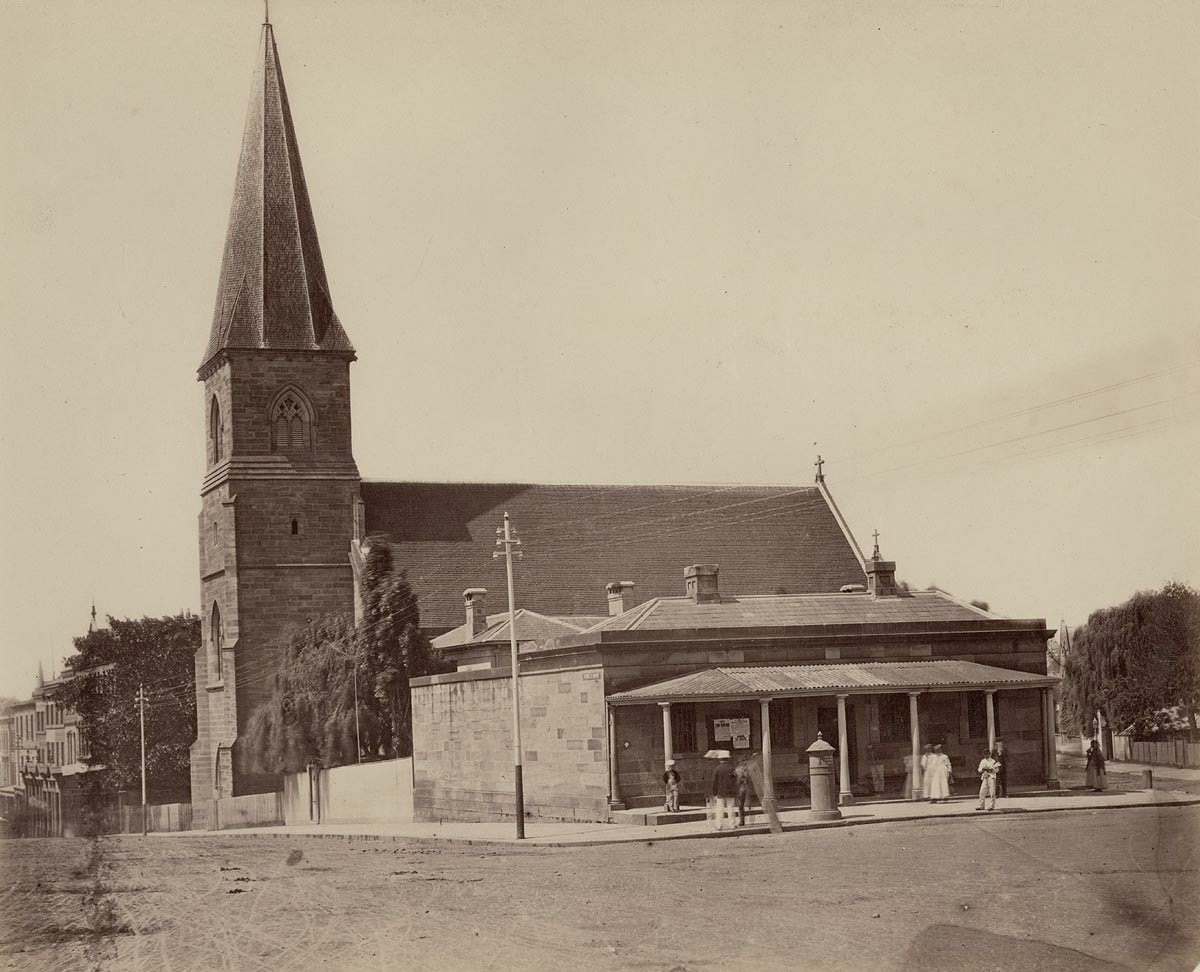
Christ Church, Sydney, c. 1880; (photo: ? Charles Percy Pickering) (State Library of New South Wales)
https://collection.sl.nsw.gov.au/record/1kVd5epn (DIGITISED)
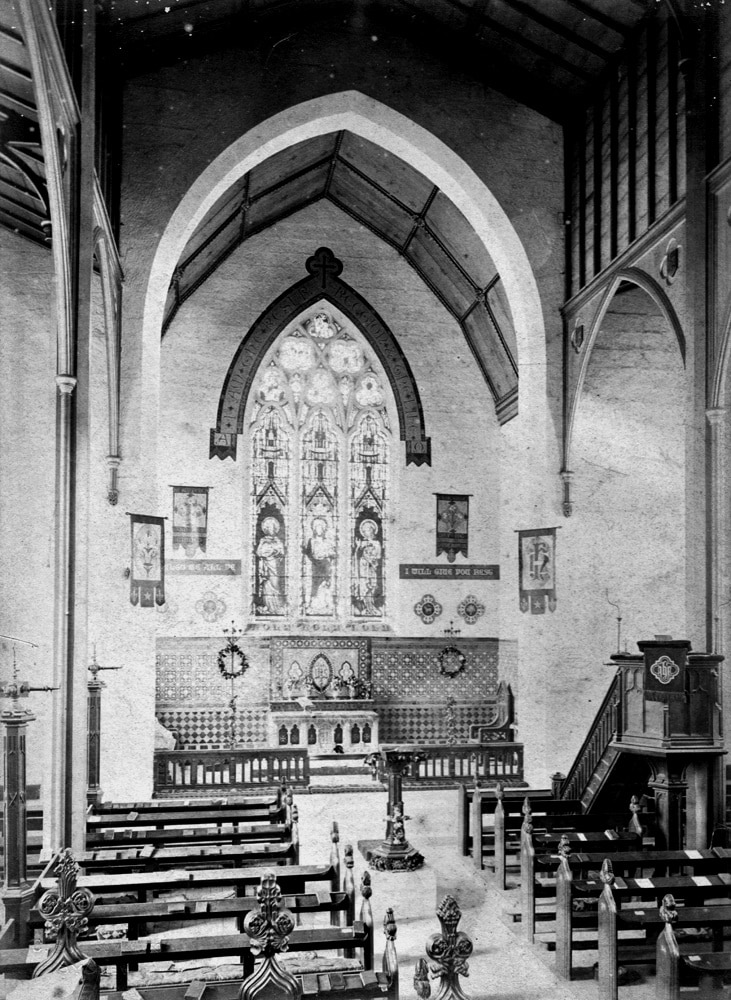
Christ Church, Sydney, 1884 (interior); Stanley was organist from 1870 to 1882; the view looking east was similar to that from the organ in the west gallery (built by George Holdich, London, in 1844, for export to Australia, destroyed by fire 1905), the "poppy" heads of the choir stalls at bottom left; with thanks to Joseph Waugh, Christ Church St Laurence
1870
"THE MOSS-ROSE WALTZES", The Sydney Morning Herald (15 March 1870), 5
http://nla.gov.au/nla.news-article13202148
Mr. William Stanley, a very Chester at musical composition, is again in the field with another set of waltzes, bearing the above title. To enter into an elaborate criticism on dance music is next to impossible; as regards waltzes there is rarely a middle state - they are either good or bad. Those before us are written in the key of B flat, in three-four time (the latter will scarcely be regarded as a piece of information), are divided into three parts, and we venture to assert that when performed they will be pronounced lively and good. They are published by Messrs. Elvy and Co.
[Advertisement], The Sydney Morning Herald (26 March 1870), 9
http://nla.gov.au/nla.news-article13202640
MR. W. STANLEY, Professor of Music, Pitt-street South, near Christ Church.
1873
[Advertisement], The Sydney Morning Herald (30 January 1873), 1
http://nla.gov.au/nla.news-article13321152
MR. W. STANLEY, Professor of Music, having REMOVED to Newport House, Norton-street, Petersham, is prepared to receive pupils in the vicinity of Marrickville, Ashfield, Burwood, and at his residence. Terms may be known by applying at Newport House; or by letter.
1877
[Advertisement, The Sydney Morning Herald (3 January 1877), 2
http://nla.gov.au/nla.news-article13396292
MR. W. STANLEY, Professor of Music, Teacher of the Pianoforte, Organ, Harmonium, Singing, Harmony (Dr. Crotch's system), Clarionet, Cornet, Sax-horn, &c. Tuition will be resumed on TUESDAY, 9th instant. Address. St. John's Road, Forest Lodge.
1880
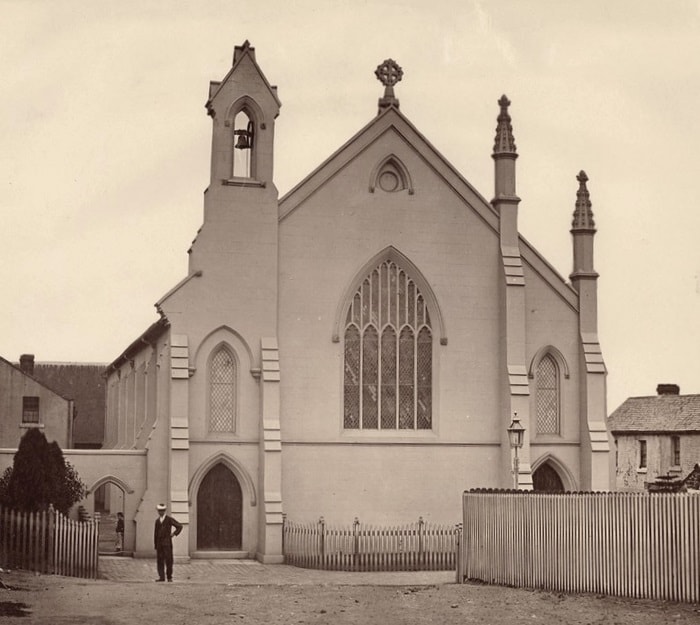
St. Barnabas's Church, Broadway, Sydney, 1870 (photo: ? Charles Percy Pickering) (State Library of New South Wales)
https://collection.sl.nsw.gov.au/record/9qoQBwJ1 (DIGITISED)
https://dictionaryofsydney.org/image/140738
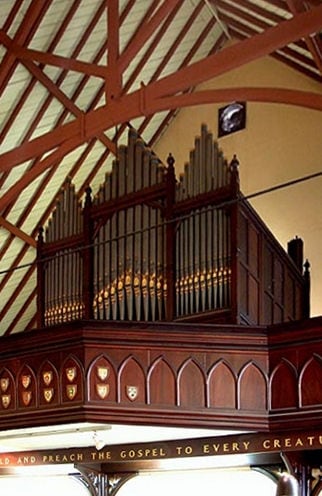
Organ, installed 1880 (Organ Historical Trust of Australia)
http://www.sydneyorgan.com/StBarn.html
"Organ Recital", Evening News (24 December 1880), 7
http://nla.gov.au/nla.news-article108748584
An interesting service and organ recital took place on Wednesday night at St. Barnabas' Church, Parramatta-street, on which occasion the Rev. Joseph Barnier read prayers, and preached an eloquent and impressive discourse on the duty of praising God . . . He gave a resume of the history of the organ from the single reed, on which it is supposed Tubal Cain played, down to the grand organ of modern times with its powerful bellows and its 1500 pipes. The organ, which they had that day consecrated to the praise of God, had cost about £950, including the setting up. Mr. Stanley presided at the organ, and performed on it most efficiently an andante movement in A, an adagio from a trio by Beethoven, and a Te Deum by Graun. The choir also sang various pieces from Monk's unison service, some hymns and psalms from Mercer's Collection, and an anthem, How lovely are the dwellings, from Spohr. The collection in aid of the organ fund amounted to £12. The organ is a very fine instrument, and will greatly assist in sustaining and improving the choral portions of divine service in the Church of St. Barnabas.
1884
"SACRED CHORAL ASSOCIATION", The Sydney Morning Herald (30 April 1884), 8
http://nla.gov.au/nla.news-article13561925
The Sacred Choral Association gave last night their second concert for the current year in the Protestant Hall, which in spite of the inclement weather was largely attended. The society chose for the first part an original oratorio, "David and the Philistines," by Mr. W. Stanley, one of the committee and conductors of the old Sacred Choral Association, formed some six years ago, preparatory to the first international exhibition in Sydney. The oratorio, which was performed for the first time in public, consists of an introduction and eight vocal numbers, and occupies about half an hour in performance. Mr. Stanley conducted, Mr. Albert Fisher was the pianist, and Mr. W. T. Sharp the organist. The chorus numbered about 60 voices. The principals were Misses Moon and Cowley, Messrs. Brewer, Peak and Hallowell. The words are selected from the scriptures. The instrumental introduction is in the sterling church music style, and though not striking in melody is genuine in composition. A short tenor recit follows, and leads into a chorus in F, 6-8 time, with an elaborate accompaniment suggesting the flight of the Philistines. The subject is well worked out and the change of key on the words, "The men of Israel and of Judah arose and slew the Philistines," is effective; there is a distinctly new treatment in the accompaniment. Again there is a return to the original key, with a new accompaniment, well worked to the close. No 3 is a tenor solo with a good melody in 3-4 lime, key A. The air is smooth and flowing. The delivery was, however, spoiled through the extreme hoarseness of the singer, Mr. Peak. Under favourable circumstances this would be an effective solo. No. 4, a short recit. for soprano, leads to the chorus of women; this is arranged first for soprani and alti singing antiphonally. Musically, this is the best number, and it was well sung. The attack of the soprano voices was far superior to that in the opening chorus. The alto voices begin "Saul hath slain his thousands," in a declamatory style. The sopranos answer, "And David his ten thousands." Finally the two sets of voices are heard reiterating each their own assertion. This is a bright, telling number, full of spirit. No. 6, "There is no King," a stately song for the bass, was allotted to Mr. Hallowell. From the first note there is a feeling of relief and confidence that the singer will bring out the best of the music. Every note is given with full value, in a scholarly manner, and with admirable effect. The song is rather laboured, and though it was very pleasant while being sung, there is nothing for the ear to carry away. The range required is extensive. Mr. Hallewell's rendering was excellent. No 7, an unaccompanied quartette, is the most ambitious number of the whole. It is troublesome to sing, and hardly grateful to the singers. There is a continual expectation of results which do not come. It is clever and original, but not melodious, and through over-elaboration the harmony at times is harsh. No. 8, the final chorus, has a really good theme, treated first in fugue style. It is throughout well constructed, and goes with spirit and vigour. The whole work is a musicianly effort, and is creditable to the composer. It was well sung. The subject of the Shepherd King has been set as a grand oratorio in 1854, or earlier, by Charles Edward Horsley, and again by Sir George Macfarren, for the recent Leeds Festival. Mr. Stanley's work was given with only harmonium and piano. From the organ score it appears that it is also arranged for orchestra, which would probably enhance the effect. Miss Moon sang the soprano recitative, and with Miss Cowley and Messrs. Brewer und Hallowell, the unaccompanied quartet, all the singers being in good voice. Mr. Stanley was warmly applauded on his appearance, during the progress, and at the conclusion of the work. The oratorio was followed by a concerto for the violoncello (No. 6 Rover) . . .
"Sacred Choral Association", Evening News (9 July 1884), 3
http://nla.gov.au/nla.news-article107265372
The Sacred Choral Association gave the third concert of the current season in the Protestant Hall last night. There was a large audience, which, judging from the applause that followed the rendition of each number on the programme, was a very appreciative one. The concert commenced with an additional solo and chorus, composed by Mr. W. Stanley since the performance of his oratorio, "David and the Philistines," in last April, and which are to be incorporated with the Oratorio. The solo and chorus are exceedingly creditable to the composer's originality and general musical ability . . .
[Advertisement], Evening News (24 December 1884), 8
http://nla.gov.au/nla.news-article107274364
MR. W. STANLEY, Professor of Music, has the honour of informing his friends and pupils that he intends taking a trip to Europe for the benefit of his health in the month of March next, and takes the opportunity of thanking the public for the support he has received during the many years he has lived in the colony of New South Wales, and hopes for a continuance of their favours on his return to Australia. TUITION will be RESUMED after the Christmas Vacation, on MONDAY, January 5, and will be continued until March 14 inclusive. STANMORE-ROAD, South Kingston. December 23.
1886
"Deaths", The Sydney Morning Herald (4 October 1886), 1
http://nla.gov.au/nla.news-article13616142
DEWEY. - August 18, at Longfield Court, Fawkham, Kent, England, Phoebe, wife of Mr J. Dewey, and second beloved sister of Wm. Stanley, Professor of Music, Stanmore-road, Petersham.
Phoebe, wife of John DEWEY, died 18 August 1886 aged 63 (Inscriptions in the Churchyard at Longfield, Kent)
1887
"A Jubilee Cantata", The Kiama Independent, and Shoalhaven Advertiser (5 July 1887), 4
http://nla.gov.au/nla.news-article101714437
A Jubilee Cantata. The following lines (says Wednesday's Echo) were written by
Mr. E. Baly at the request of the well-known musician, Mr. William Stanley, who wished to set them to music. This his Jubilee Cantata will be sung by the St Barnabas's Musical Society on Monday evening with orchestral accompaniments:
What means that loud and hearty cheer
Which breaks upon the listening ear?
Why throng the busy streets to-day
The brave, the bold, the fair, the gay?
Each plays a part in this grand scene,
To render homage to their Queen . . .
1888
[Advertisement], The Sydney Morning Herald (15 February 1888), 18
http://nla.gov.au/nla.news-article13681829
MISS MABEL STANLEY, Pianiste, daughter of Professor Stanley, has resumed tuition in music. Circulars may be obtained at her residence, Stanmore-road, Petersham.
1890
"Petersham Philharmonic Society", Evening News (4 February 1890), 3
http://nla.gov.au/nla.news-article108799051
Petersham Philharmonic Society. The abovenamed society gave the second concert of its first season at the Petersham Town Hall last night in the presence of a large audience. The first part of the programme consisted of a cantata by W. H. Birch, entitled 'Eveleen, the Rose of the Vale" and the second part comprised a miscellaneous selection of duets and vocal and instrumental solos. Mr. W. Stanley conducted, and his daughter, Miss Mabel Stanley, skilfully presided at the piano . . . The Myrtle Waltzes, composed by Mr. Stanley, were performed by the orchestra, and went with a swing sufficient to produce a commotion in a ballroom. The melodies of these waltzes are pretty, and they are nicely instrumented. The society possesses a very fair orchestra, and is fortunate in having secured the services of such a thoroughly competent musician and energetic conductor as Mr. W. Stanley. This fact may be regarded as an indication of the society's success in the future, for it is well known that Mr. Stanley is a skilful trainer, and will make the most of whatever talent may be placed at his disposal.
1891
"Deaths", The Sydney Morning Herald (30 November 1891), 1
http://nla.gov.au/nla.news-article13849219
JONES - October 1, 1891, at Eastbourne, England, Mrs. Ann Jones, in her 70th year, much regretted by her relatives and friends, eldest dearly beloved sister of Mr. William Stanley, Professor of Music, Stanmore-road, Petersham.
1893
[Advertisement], The Sydney Morning Herald (14 January 1893), 13
http://nla.gov.au/nla.news-article13893602
MISS MABEL STANLEY, Teacher of Piano-forte, resumes Tuition on Monday, Stanm.-rd., P'sm.
1900
"Deaths", The Sydney Morning Herald (8 November 1900), 1
http://nla.gov.au/nla.news-article14339504
STANLEY. - November 4, 1900, Florence Emma, beloved eldest daughter of William Stanley, Professor of Music, Stanmore. At rest.
1902
"Deaths", The Sydney Morning Herald (11 September 1902), 1
http://nla.gov.au/nla.news-article14523755
STANLEY.- September 10, 1902, at his late residence, Leura, Morgan-street, Petersham, William Stanley, Professor of Music, beloved husband of the late Mary Ann Stanley, in his 83rd year. Home papers please copy.
"THE OLDEST PIANIST IN AUSTRALIA", The Sydney Morning Herald (18 September 1902), 8
http://nla.gov.au/nla.news-article14510138
It is with regret that we learn of the death of Mr. William Stanley, who was born at Windsor Castle on May 29, 1820. He was a son of the late organist of St. George's Chapel Royal Windsor, and was educated at the chapel where he remained until 1836. He started his musical career at the very early age of six years, and at the age of 10 he played solos at Rochester, in Kent, and performed at Windsor Castle before Queen Adelaide, both of these performances being his own compositions. He was also a singer at the funeral of the late King George IV.
Shortly after this Mr. Stanley joined the army, having enlisted with the 80th Regiment under the command of Colonel Pitt of Chatham. In this regiment he served for about five years, after which he took his passage to Australia in charge of a vessel sent here by the home Government with prisoners on board, which arrived here about the year 1837.
His first performance in Australia was at the opening of the original "Victoria Theatre" in the presence of the Governor at that time (Sir George Gipps), after which Mr. Stanley acted as accompanist to the late Madam Sara Flower the noted contralto, Miska Hansa [Hauser] the celebrated violinist, and Madam Anna Bishop the English soprano. He also played duos with Bolanger [Boulanger], the French pianist.
Mr. Stanley s first appointment as an organist was at St. John's, Parramatta, during the time of the Rev. H. H. Bobart, where he remained for eight years. Later on Mr. Stanley was appointed organist to the Sydney Choral Association, and held the position of bandmaster to the first volunteer artillery band. He was also first lieutenant to the South Sydney Volunteers, for which corps he organised a band on his own account. He also held positions as organist to the following churches viz: St. Andrew's Cathedral for 16 years, St. Barnabas for seven years, and Christ Church, Sydney, for 12 years.
Amongst some of Mr. Stanley's many excellent compositions are "Variations to God Save the King" an arrangement he wrote at the age of 8 1/2 years; two marches, one in C minor and the other in E flat, written at 10 years of age; an oratorio, "David and the Philistines", march and preludes to Handel's "Israel in Egypt", numbers of church anthems and chants, and over 100 various other pieces in addition to this he wrote a Jubilee Ode to celebrate the Jubilee of our late Queen Victoria, words by the late Edward Baly.
In 1879-80, at the musical festival at the International Exhibition here, Mr. Stanley conducted "The Messiah" and "Israel in Egypt" before an audience of 10,000 people and on the death of the late Charles Packer that composer's sacred cantata, "The Crown of Thorns", was completed by the late Mr. William Stanley.
Mr. Stanley also held a high position in the Masonic Lodge. Mr. Stanley, who died at Petersham last week, was buried at Rookwood. He leaves a family of grown up children of three sons and two daughters.
After 1902
"MISS MABEL STANLEY'S CONCERT", The Sydney Morning Herald (21 December 1905), 8
http://nla.gov.au/nla.news-article14721192
The pupils of Miss Mabel Stanley, assisted by their teacher and other artists, gave a concert to a large audience at the Empire Hall, Gordon street, Petersham, on Tuesday evening. Considerable proficiency was exhibited by many of the pupils, who appeared to have been carefully trained. The vocal contributions of Miss Edith Hunt added to the general enjoyment, this artiste's rendering of "Roberto tu che Adoro" being marked by finish and good vocal quality. Mr. H. Hadley sang pleasingly, and Miss Stanley demonstrated her capacity as a pianist with Chopin's Polonaise from op. 22. An orchestra showed good training in several selections, including Farmer's "Un ballo in Maschcra" and "Guillaume Tell."
[Advertisement], The Sydney Morning Herald (11 January 1908), 18
http://nla.gov.au/nla.news-article14891477
MISS MABEL STANLEY, teacher of piano, theory, painting, res. Jan. 15, Tasma, Durham-st, Dul.H.
Sands' directory 1909-19
Miss L. Stanley, music teacher, George Street [Palings]
"DEATHS", The Sydney Morning Herald (18 January 1947), 38
http://nla.gov.au/nla.news-article27905340
STANLEY, Louisa Susannah. - January 17, 1947 at a private hospital, daughter of the late Professor William Stanley (Stanmore) and sister of Mabel and James, of Prospect Road, Summer Hill.
"DEATHS", The Sydney Morning Herald (25 August 1947), 16
http://nla.gov.au/nla.news-article18045854
STANLEY, Mabel Josephine. - August 23, 1947 at Hospital, daughter of the late Professor William Stanley (Stanmore) and sister of Louisa (deceased) and James, of 78 Prospect Road, Summer Hill.
Extant musical works
![Tell him I love him yet, William Stanley (Sydney: Grocott, [1850]), 1](imageslocal/stanley-tell-him-2.jpg)
Tell him I love him yet (1850)
https://trove.nla.gov.au/search?l-publictag=Tell+him+I+love+him+yet+(Stanley) (TROVE tagged by Australharmony)
First performed by Sara Flower (contralto vocalist), at Edward Baly's concert, Royal Hotel, Sydney, 7 June 1850
First published by Jame Turner Grocott, Sydney, 28 June 1850
Tell him I love him yet, ballad, the music by William Stanley, sung by Miss Sara Flower with much applause at the Sydney concerts (Sydney: Printed and published for Mr. Stanley by J. T. Grocott, n.d. [1850])
https://trove.nla.gov.au/work/19203968/version/22562389
Copy at the National Library of Australia
https://nla.gov.au/nla.obj-181784586 (DIGITISED)
Tell him I love him yet . . . new edition (Sydney: Woolcott and Clarke, [1853])
https://trove.nla.gov.au/work/19203968/version/47478535
![The Sydney polka, William Stanley (Sydney: Woolcott and Clarke, [1851])](imageslocal/stanley-sydney-polka.jpg)
The Sydney polka (1851)
https://trove.nla.gov.au/search?l-publictag=The+Sydney+polka+(Stanley) (TROVE tagged by Australharmony)
First performed by Stanley, Band of the 11th Regiment, Stanley and James Waller's concert, Royal Hotel, Sydney, 22 May 1851
First published by Henry Marsh, Sydney, 23 May 1851
The Sydney polka, composed and respectfully dedicated to the ladies of Sydney by William Stanley (Sydney: Published (for the author) by H. Marsh, [1851])
https://trove.nla.gov.au/work/16444927
Copy at the National Library of Australia
http://nla.gov.au/nla.obj-165950646 (DIGITISED)
![Eugenie schottische, William Stanley (Sydney: Woolcott and Clarke, [1855])](imageslocal/stanley-eugenie-schottische.jpg)
Eugenie schottische (1855)
https://trove.nla.gov.au/search?l-publictag=Eugenie+schottische+(Stanley) (TROVE tagged by Australharmony)
First published by Woolcott and Clarke, Sydney, in Australian presentation album for 1855, January 1855
Eugenie schottische, composed by W. Stanley (Sydney: Woolcott and Clarke, [1855])
Bound in Woolcott and Clarke's Australian presentation album for 1855; and copies later sold separately
https://trove.nla.gov.au/work/16482596
Copy at the National Library of Australia
http://nla.gov.au/nla.obj-165969771 (DIGITISED)
Eugenie schottische, composed by W. Stanley, unidentified MS copy dated 7 October 1857; National Library of Australia
https://trove.nla.gov.au/version/23011948
http://nla.gov.au/nla.obj-165870838 (DIGITISED)
The myrtle waltzes (1855)
NO COPY IDENTIFIED
[Advertisement], Empire (21 February 1855), 8
http://nla.gov.au/nla.news-article60177590
NEW MUSIC. - Just published, price 3s. THE MYRTLE WALTZES, dedicated by permission to Miss Annie Campbell; air composed by William Stanley. WOOLCOTT AND CLARKE, Music Publishers, 555, George-street.
![The heliotrope mazurka, William Stanley (Sydney: Clarke, [1857])](imageslocal/stanley-heliotrope-nla.mus-an5350560-s15-v.jpg)
The heliotrope mazurka (1857)
https://trove.nla.gov.au/search?l-publictag=The+heliotrope+mazurka+(Stanley) (TROVE tagged by Australharmony)
First published by Jacob Richard Clarke, Sydney, by 6 March 1857
The heliotrope mazurka by William Stanley (Sydney: J. R. Clarke, [1857])
[on first page of music] The heliotrope mazurka, dedicated to Miss C. Joseph, by W. Stanley
Copies of the original 1857 edition also bound in Clarke's Australian musical album for 1863
Copy at the National Library of Australia
https://trove.nla.gov.au/work/12840709
http://nla.gov.au/nla.obj-181843172 (DIGITISED)
ASSOCIATIONS: Caroline Joseph (1841-1930), eldest daughter of the late Nathan Joseph, married Emanuel Mandelson in Sydney in February 1860
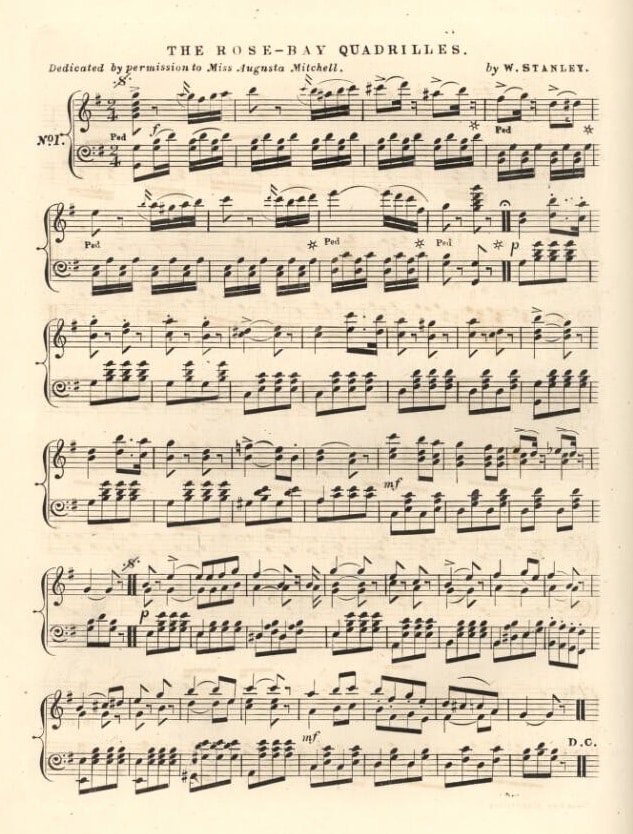
The Rose Bay quadrilles (1857)
https://trove.nla.gov.au/search?l-publictag=The+Rose+Bay+quadrilles+(Stanley) (TROVE tagged by Australharmony)
First published by Jacob Richard Clarke, Sydney, in the Australian album 1857, December 1856
The Rose Bay quadrilles by William Stanley (Sydney: J. R. Clarke, [1857])
[first page of music] The Rose-Bay quadrilles, dedicated by permission to Miss Augusta Mitchell, by W. Stanley
Bound in Clarke's Australian Album 1857; copies also sold separately
https://trove.nla.gov.au/work/7780476
Copy at the National Library of Australia
https://trove.nla.gov.au/version/15188842
http://nla.gov.au/nla.obj-164692869 (DIGITISED)
ASSOCIATIONS: Augusta Mitchell (1834-1922),
Modern edition:
The Rose Bay quadrilles (by William Stanley, edited by Peter Sculthorpe) (London: Faber Music, 1989)
https://trove.nla.gov.au/version/8965309
See also sound recordings of Sculthorpe edition ("arrangement") at
https://trove.nla.gov.au/work/10694757
https://trove.nla.gov.au/version/209417454
According to Sculthorpe, the original work was "commissioned by David Cooper to mark the laying of the foundation stone of Woollahra House on December 15, 1856". Rather, it was for Daniel Cooper (speaker of the Legislative Assembly) that the Governor, William Dennison, laid a foundation stone for the mansion Cooper intended to build at Point Piper, in place of Henrietta Villa. Reports in the press noted that two bands were present and played at the event, and later at the reception and dance for guests at Cooper's then residence, Rose Bay House. Cooper left for England in 1861 before the house was completed. Woollahra House was finished to a new design in 1883 for Daniel's son William, but it was demolished in 1929. Whether or not the quadrilles were composed and/or played for Cooper, Stanley dedicated them on publication that same month, December 1856, to Augusta Mitchell (1834-1922), daughter of James Mitchell and Augusta Scott, and sister of David Scott Mitchell (1836-1907); she married Edward Christopher Merewether (1820-1893) in Sydney in 1860
Performances (of Sculthorpe's edition) by Tamara-Anna Cislowska, ABC Classics, on Youtube
No. 1 - https://www.youtube.com/watch?v=ym1FNzhvIP0 (STREAMED)
No. 2 - https://www.youtube.com/watch?v=lBrHHqNh0Iw (STREAMED)
No. 3 - https://www.youtube.com/watch?v=mKxj0e96OuY (STREAMED)
No. 4 - https://www.youtube.com/watch?v=NSSTDxL7rQg (STREAMED)
No. 5 - https://www.youtube.com/watch?v=kI41VFn-vSE (STREAMED)
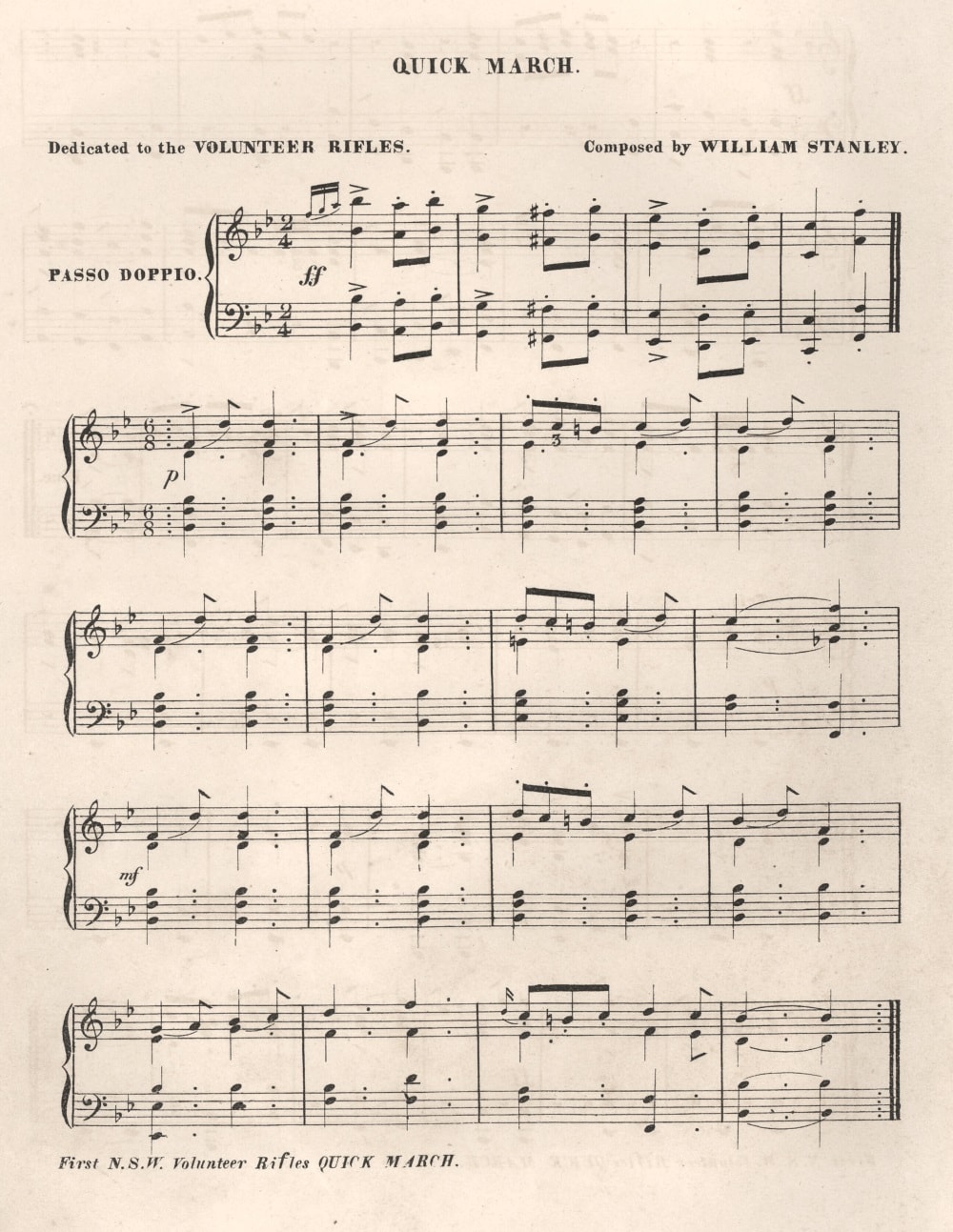
The N.S.W. Volunteers Rifles quick march (1861)
https://trove.nla.gov.au/search?l-usertag=NSW+Volunteer+Rifles+quick+march+(Stanley) (TROVE tagged by Australharmony)
First advertised, November 1860, published by Jacob Richard Clarke, Sydney, April 1861
The N.S.W. Volunteers Rifles quick march (dedicated to the Volunteer Rifles, South Sydney Company) (Sydney: J. R. Clarke, [1861])
https://trove.nla.gov.au/work/12840658
Copies of the original 1857 edition also bound in Clarke's Australian musical album for 1863
http://nla.gov.au/nla.obj-164696576 (DIGITISED)
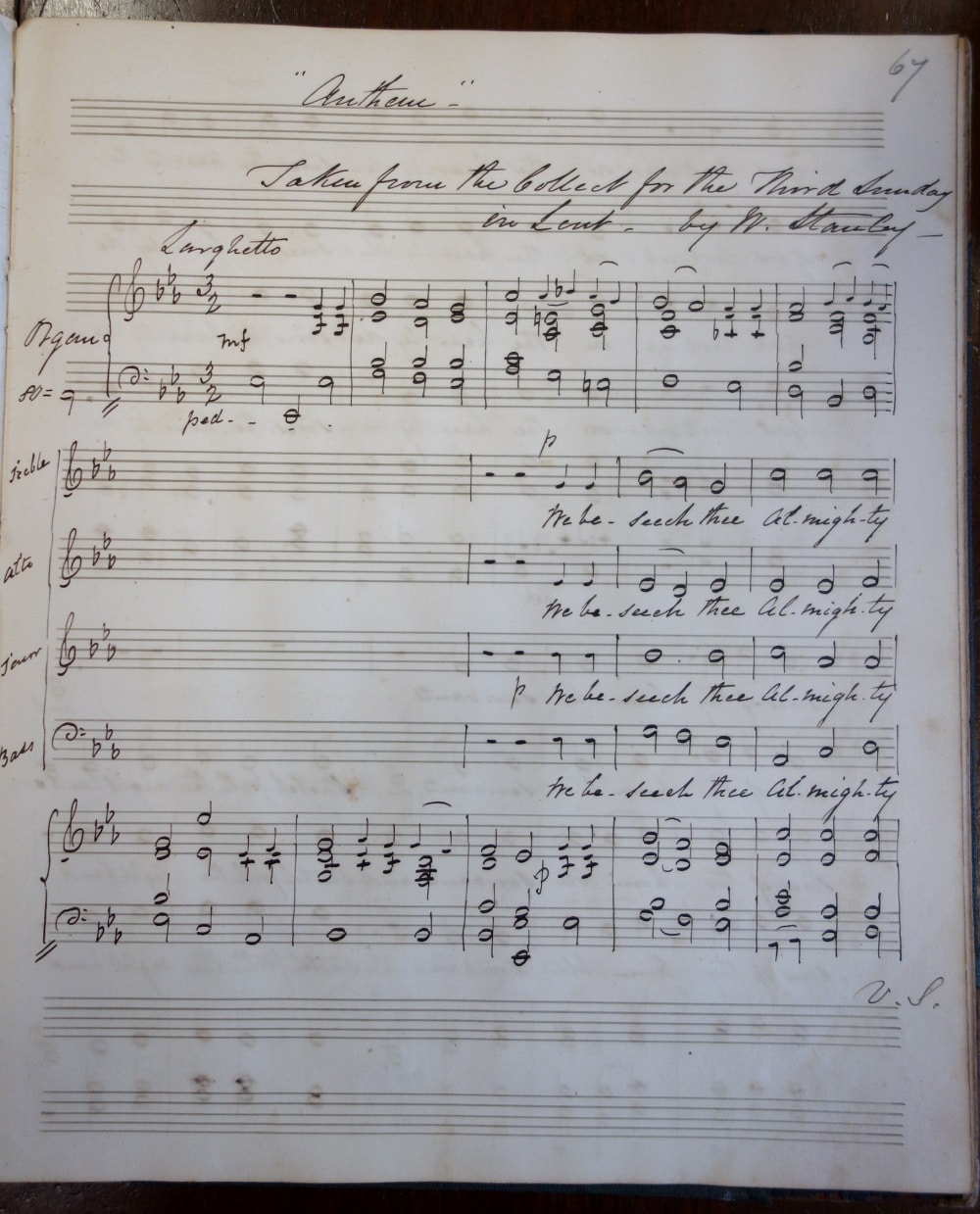
We beseech thee almighty God (1871)
We beseech thee almighty God (anthem taken from the Collect for the Third Sunday in Lent, by W. Stanley, 27 January 1871); MS scorebook and partbooks set, Christ Church St. Laurence, Sydney; complete facsimile in Forsyth 2002, 505-10; image above from scorebook, first page
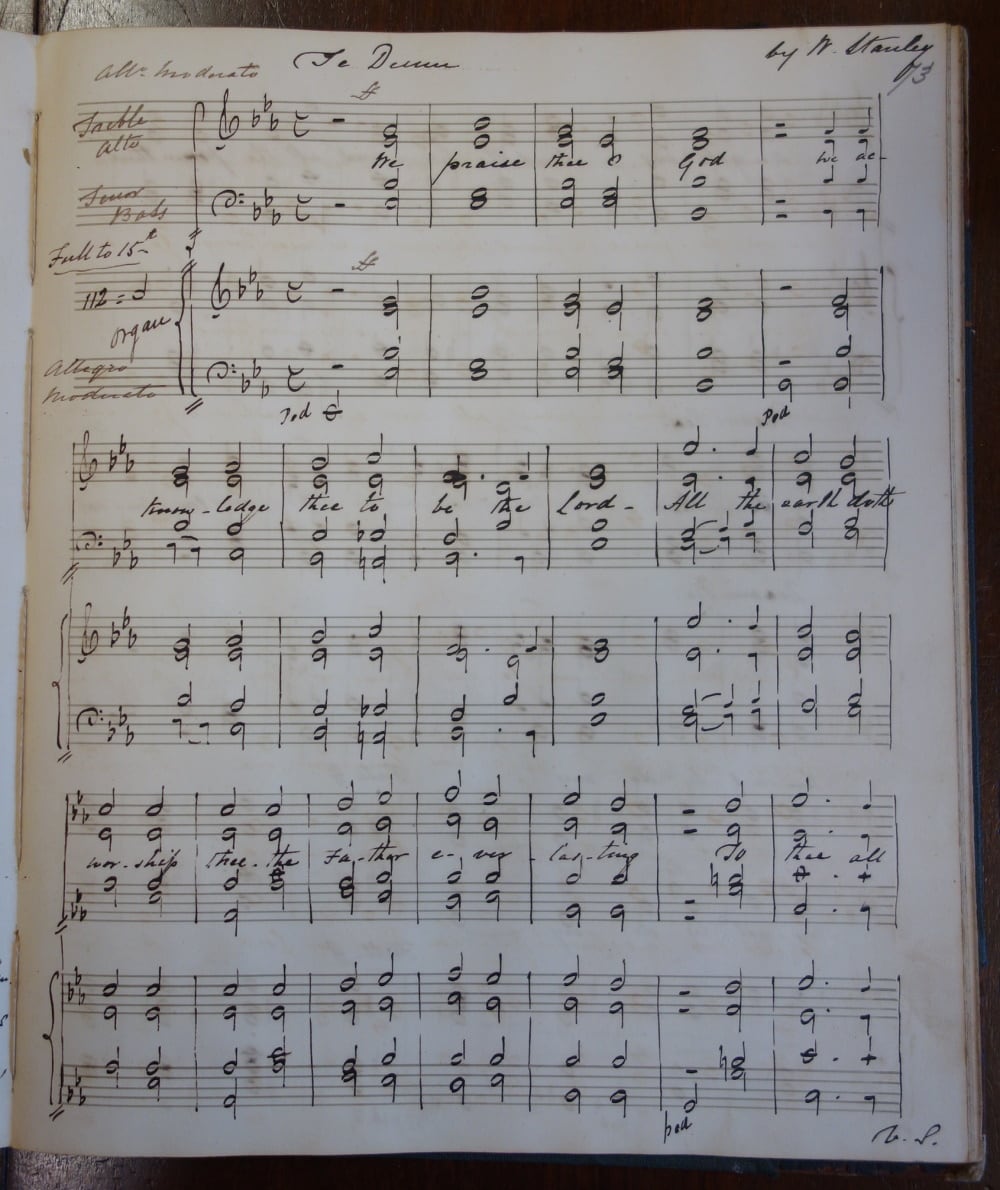
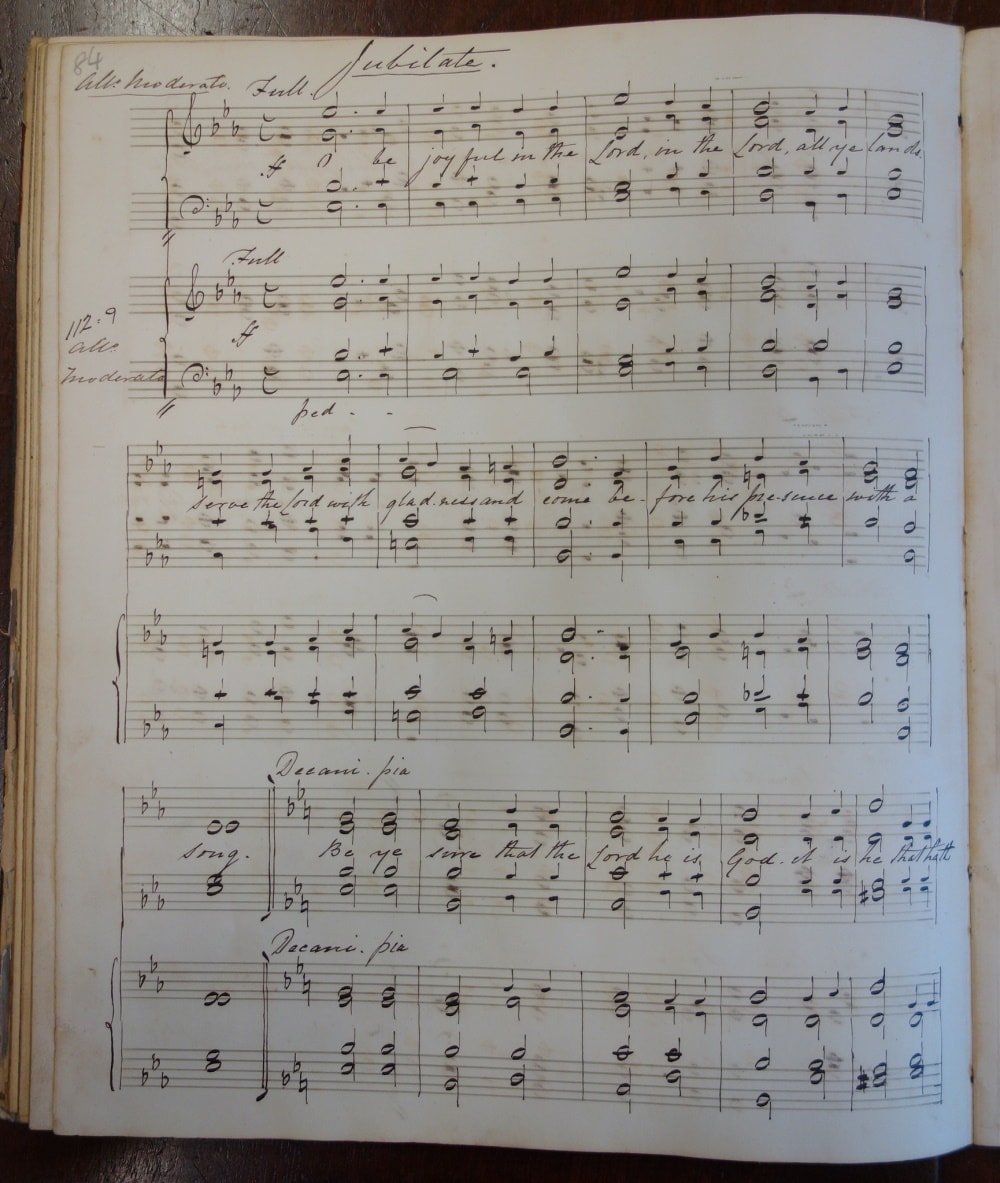
Te Deum and Jubilate in E flat (1873)
Te Deum and Jubilate in E flat (by W. Stanley, '73 [1873]); MS scorebook and partbooks set, Christ Church St. Laurence, Sydney; complete facsimile in Forsyth 2002, 511-27; images above from scorebook, first page of each movement
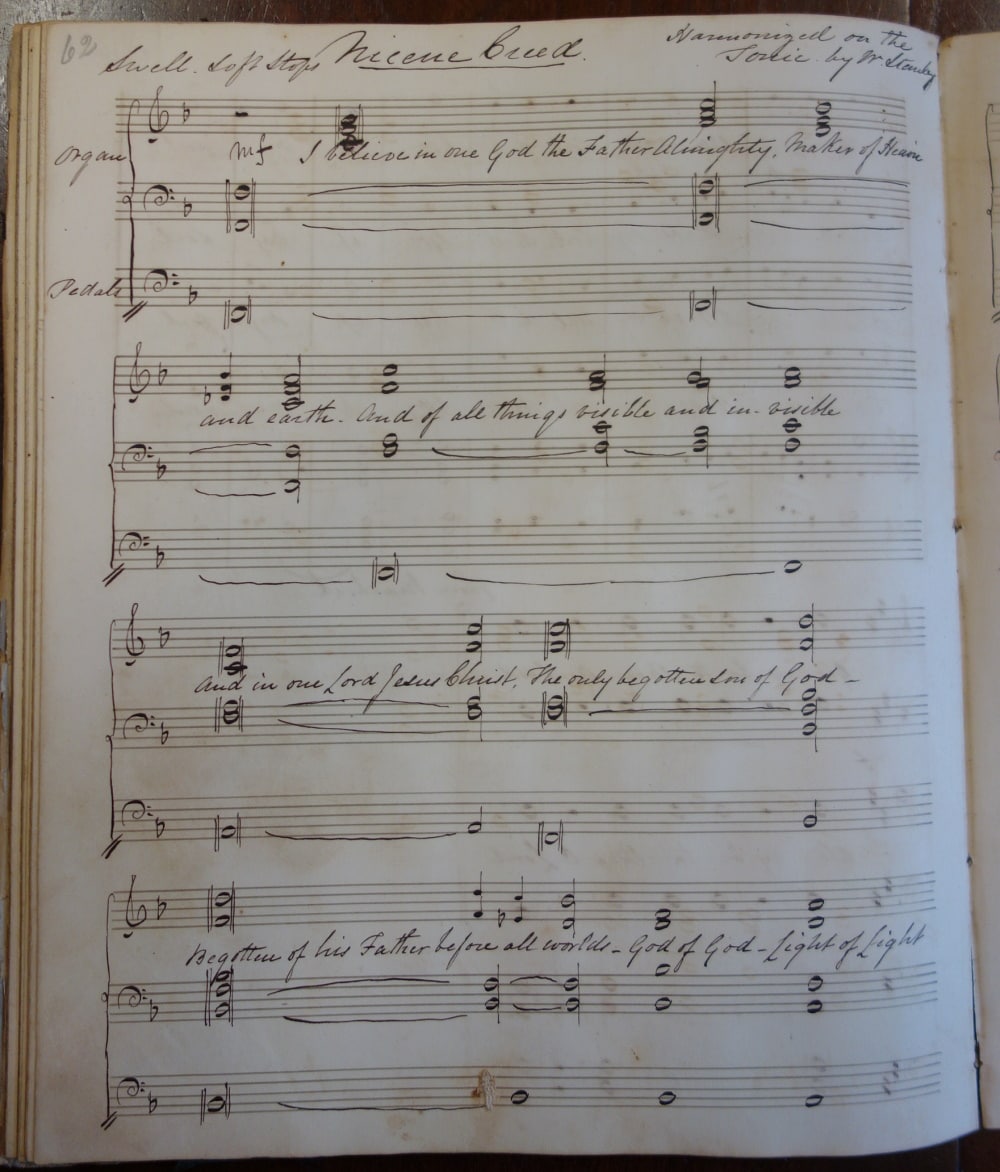
Nicene creed (? c. 1870s)
Nicene creed (harmonized on the tonic by W. Stanley [undated]); MS, MS scorebook and partbooks set, Christ Church St. Laurence, Sydney; complete facsimile in Forsyth 2002, 500-03; image above from scorebook, first page
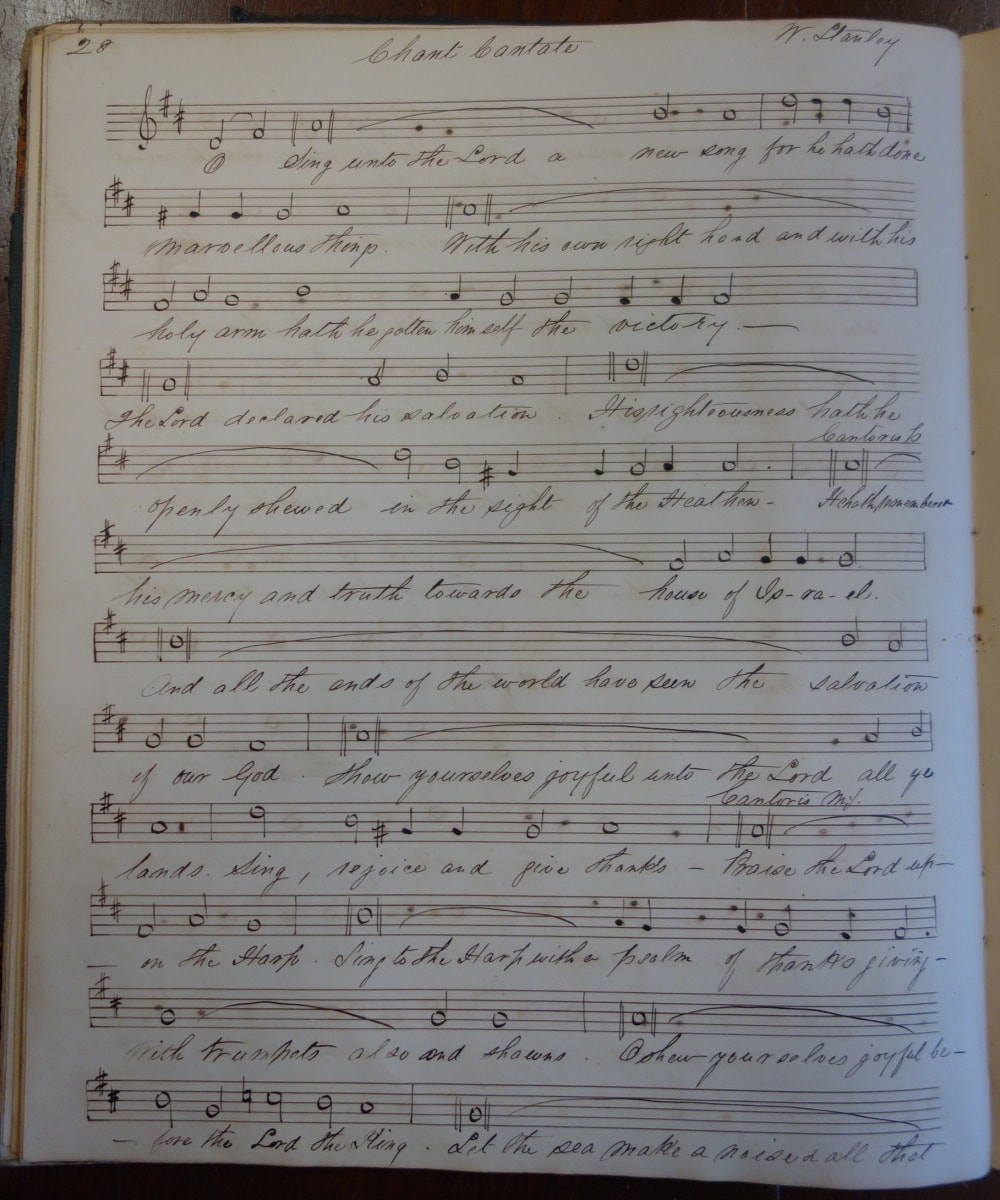
Cantate domino and Deus misereatur (cahnt evening service) (? c. 1870s)
Cantate domino and Deus misereatur; MS partbooks set, Christ Church St. Laurence, Sydney; image above from treble partbook, first page
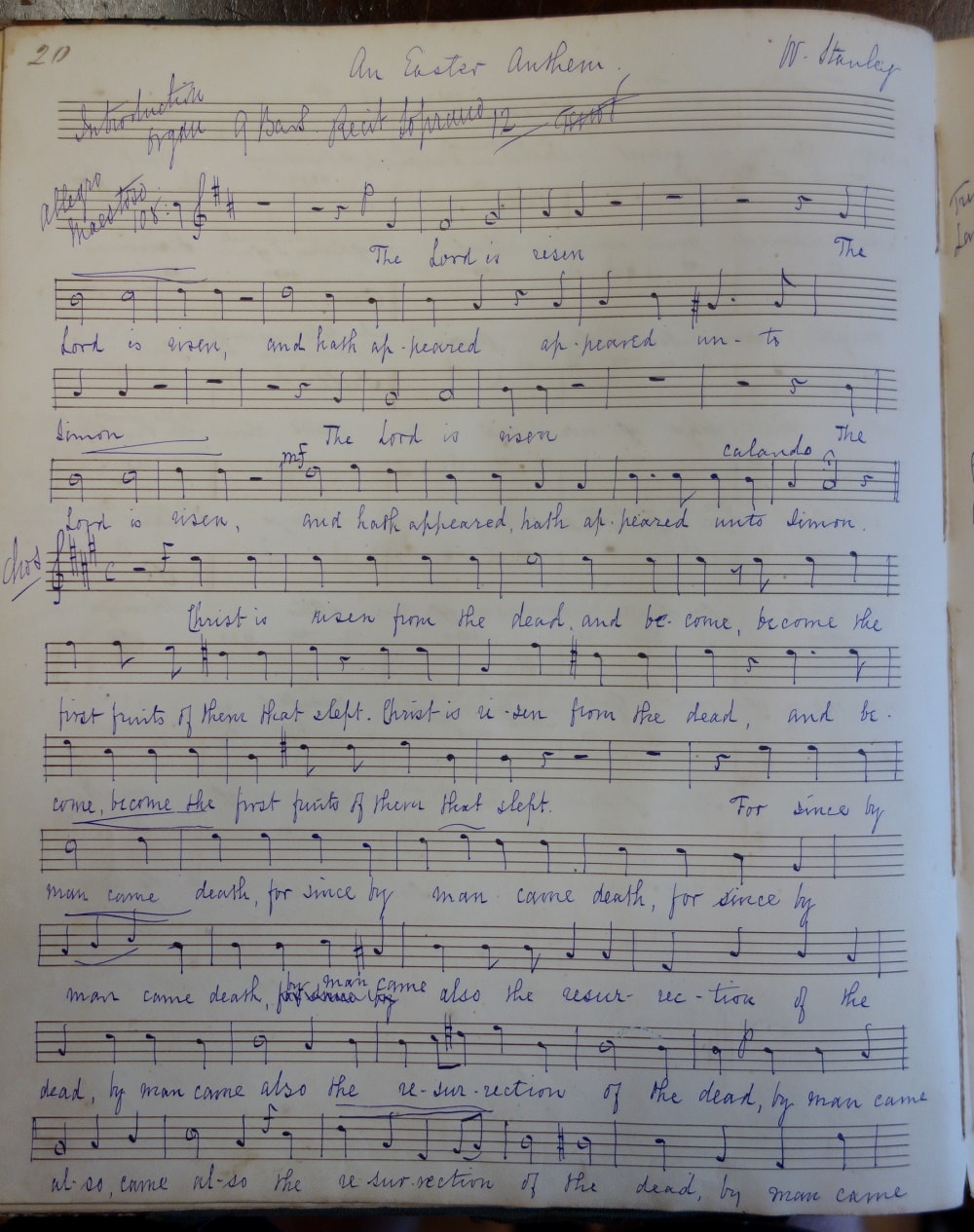
Easter anthem (The Lord is risen) (? c. 1870s)
Easter anthem (The Lord is risen and hath appeared unto Simon . . .); MS partbooks set, Christ Church St. Laurence, Sydney; image above from tenor partbook, first page
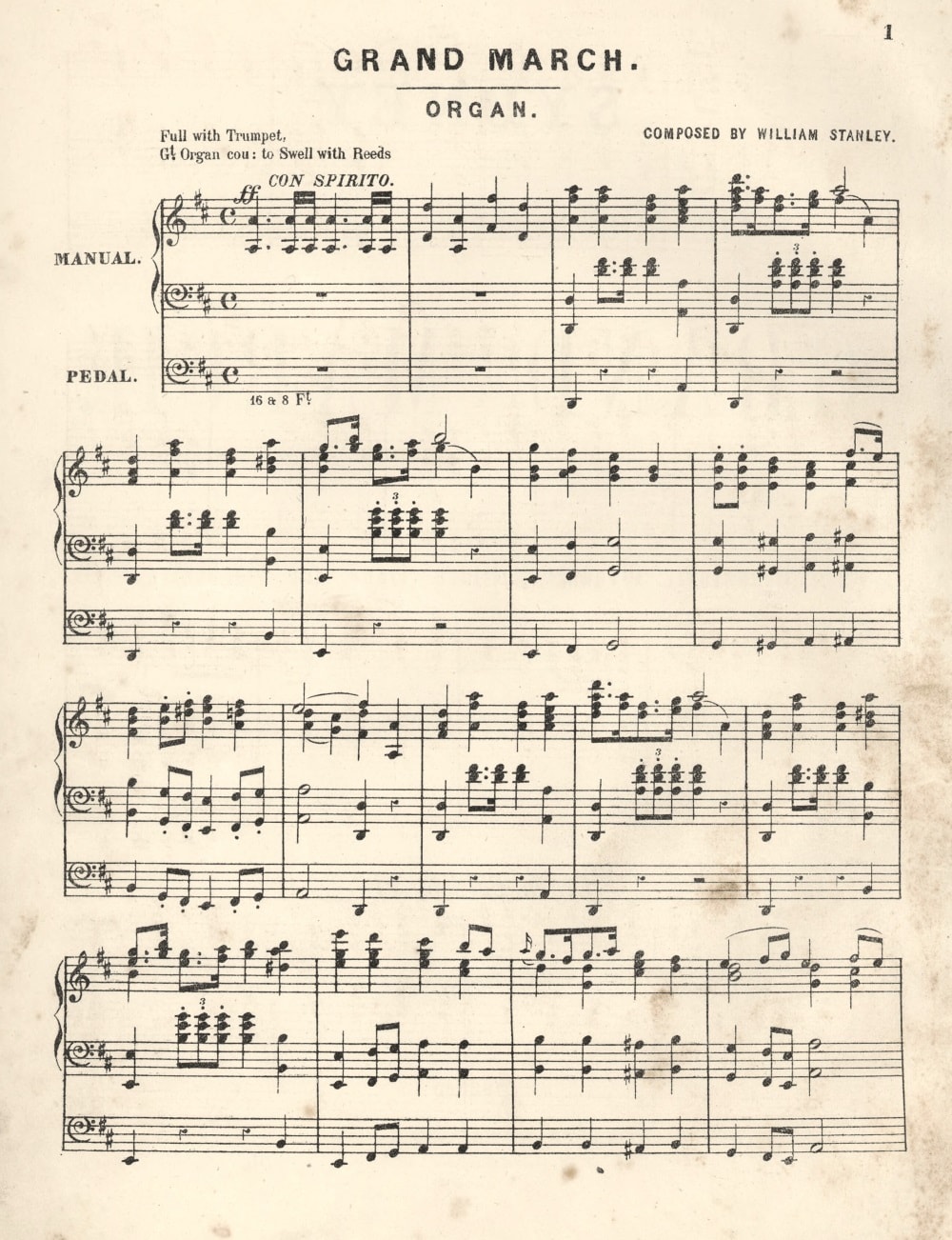
Sydney International Exhibition grand march (1879)
Sydney International Exhibition grand march (composed and arranged for the pianoforte, organ, military band, and orchestra by William Stanley) (Sydney: John Sands, 1879)
https://trove.nla.gov.au/work/19400039
Copy at National Library of Australia
http://nla.gov.au/nla.obj-176880182 (DIGITISED)
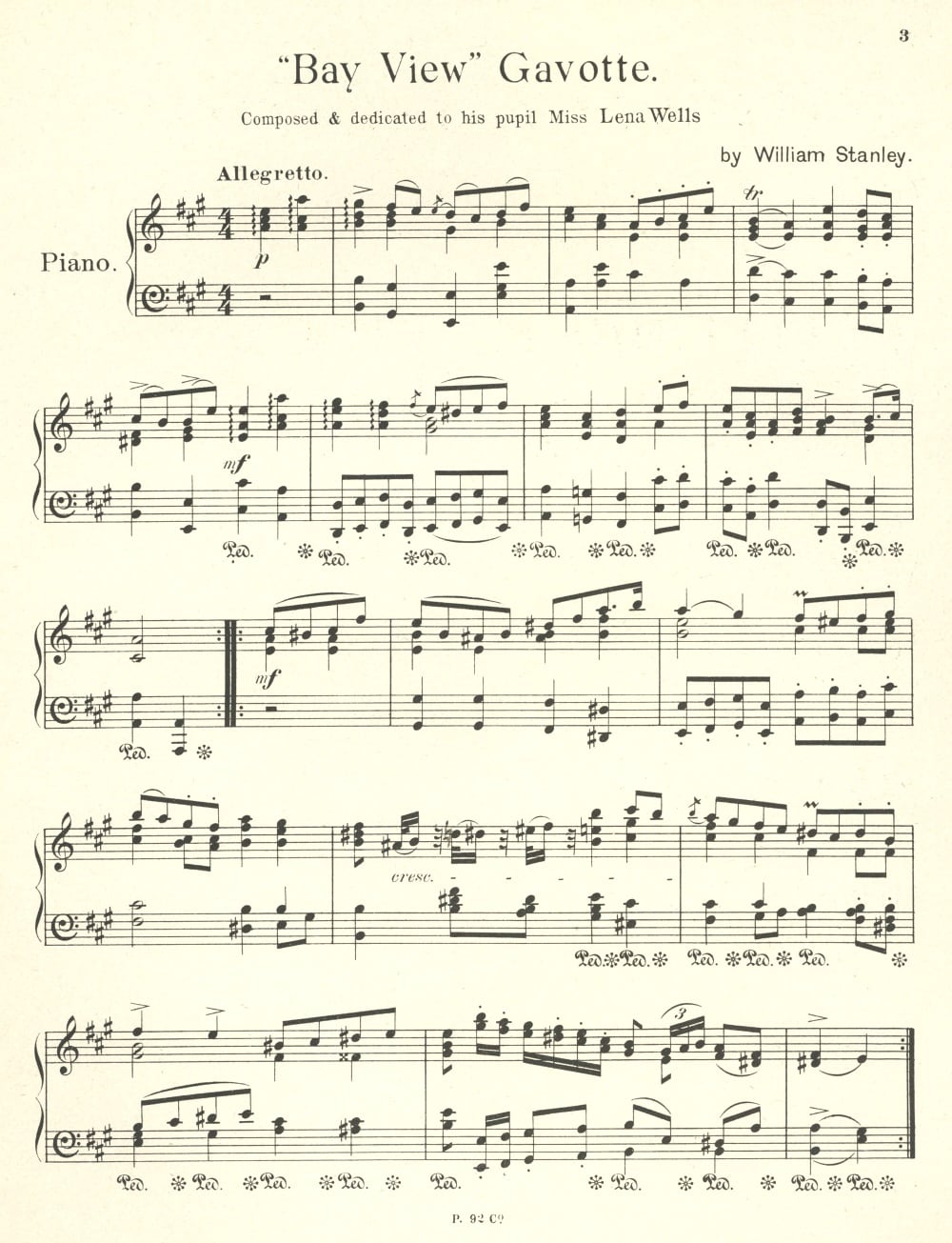
Bay View gavotte (1893)
Bay View gavotte (composed and dedicated to his pupil Miss Lena Wells by William Stanley) (Sydney: W. H. Paling & Co., [1893])
https://trove.nla.gov.au/work/12872816
Copy at National Library of Australia
http://nla.gov.au/nla.obj-164768895 (DIGITISED)
Editions and arrangements
The crown of thorns (oratorio, by Charles Sandys Packer, 1863, posthumously edited for publication by William Stanley)
The crown of thorns; or, Despair, penitence, and pardon, an oratorio., words and music by Charles S. Packer (London and New York: Novello, Ewer & Co; Sydney: A. & C. Huenerbein, [1886])
https://trove.nla.gov.au/work/6307625/version/7284600
http://nla.gov.au/nla.obj-172247074 (DIGITISED)
"THE OLDEST PIANIST IN AUSTRALIA", The Sydney Morning Herald (18 September 1902), 8
http://nla.gov.au/nla.news-article14510138
. . . on the death of the late Charles Packer that composer's sacred cantata, "The Crown of Thorns", was completed by the late Mr. William Stanley.
"MUSICAL ECHOES", The Brisbane Courier (30 April 1886), 6
http://nla.gov.au/nla.news-article4490218
Many in this colony will remember the late Charles Packer, and probably several have had the pleasure of hearing his "Crown of Thorns" performed in the adjoining colony. Since the death of the composer the publication of this charming composition has been undertaken by subscription, and the subscribers, and musicians generally, will be glad to learn that the work has arrived by the Liguria, and is being delivered by Mr. August Huenerbein, of Sydney, the honorary secretary of the Packer Fund . . .
Bibliography and resources
[John Benson Martin], Reminiscences by J. B. M. being a reprint from the Camden Times, 1883 (Camden: A. J. Doust, Times Office, 1884), (40)-41
https://nla.gov.au/nla.obj-425571128/view?partId=nla.obj-425930253#page/n42/mode/1up (DIGITISED)
[40] . . . The amusements of the Sydneyites were confined to small family parties; and a few fiddlers found steady employment by hiring out for the evening. Pianos were rarely heard, and Ellard's was the only music shop; but the daily playing of the military bands compensated for the deficiency. Ladies obtained their best music through the officers, and bandsmen earned a good deal by copying it. [41] Mr. Thomas Stubbs, the great auctioneer, Signor Chiodetti, and Mr. Stanley taught among the best families, and for the encouragement of pupils musical parties were held occasionally, at which the brothers Spyer, the merchants, Germans, who were charming amateur violinists, used to assist . . .
Also: "Reminiscences", Australian Town and Country Journal (26 January 1895), 14
http://nla.gov.au/nla.news-article71224980
John E. West, Cathedral organists past and present: a record of the succession of organists of the cathedrals, chapels royal, and principal collegiate churches of the United Kingdom, from about the period of the reformation until the present day . . . (London: Novello and Company, 1899), 133
https://archive.org/stream/cathedralorganis00westuoft#page/132/mode/2up (DIGITISED)
[St. George's Windsor] William Sexton 1801-1824. Born 1764. Chorister in St. Georges Chapel, Windsor, and in Eton College. Pupil of Edward Webb. For some years Assistant Organist of St. George's Chapel. Organist, Sub Precentor, and Master of the Choristers, 1801. Died 1824. Composer of Church Music, Glees, Songs, &c.
Edmund H. Fellowes, Organists and masters of the choristers of St. George's Chapel in Windsor Castle (Windsor: St. George's Chapel, 1939; 1974), 67-68
https://trove.nla.gov.au/version/25721441
Edmund H. Fellowes and Elisabeth R. Poyser (eds.), The baptism, marriage, and burial registers of St. George's Chapel, Windsor (Windsor: For the Dean and canons of St. George's Chapel by Oxley, 1957), 42, 253
https://trove.nla.gov.au/version/20028346
W. Arundel Orchard, Music in Australia: more than 150 years of development (Melbourne: Georgian House, 1952), 31, 52, 102, 172
https://archive.org/details/in.ernet.dli.2015.28983/page/n55/mode/2up (DIGITISED)
Neville Wridgway, The chorister's of St. George's Chapel, Windsor Castle (London: Chas. Luff, 1980)
. . . In March 1834 there were apparently only seven boys in the choir of St. George's Chapel. A letter from the organist, Highmore Skeats, to an unknown recipient, evidently in reply to a request for the services of the choir, lists the seven boys by name and ten lay-clerks who included the alto Jarman, John Mitchell, and Josiah French.
Graeme D. Rushworth, Historic organs of New South Wales: the instruments, their makers and players 1791-1940 (Sydney: Hale and Iremonger, 1988), 272, 292
James Forsyth, Music of the Anglican churches in Sydney and surrounding regions: 1788-1868 (Ph.D thesis, University of Sydney, 2002), passim
http://hdl.handle.net/2123/2447 (DIGITISED)
Graeme Skinner. Toward a general history of Australian musical composition: first national music, 1788-c. 1860 (Ph.D thesis, Sydney Conservatorium of Music, University of Sydney, 2011), 361-62, and passim
http://hdl.handle.net/2123/7264 (DIGITISED)
William Stanley (composer), Wikipedia
https://en.m.wikipedia.org/wiki/William_Stanley_(composer)
© Graeme Skinner 2014 - 2026